#manga analysis
Text
I think chapter 2 of TriMax Volume 6 might just be my favorite thus far. Everything in it hinges on this one iconic scene.

This isn't the first time Wolfwood has pointed a gun at Vash's head. Maybe it won't even be the last. But it holds a bit more weight here because just a few pages ago, we saw a flashback where Wolfwood pointed his gun at someone else's head.
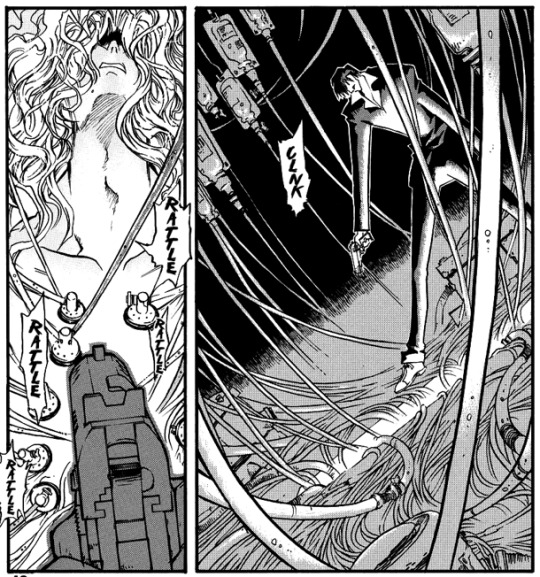
His hand shakes as he aims at Knives. His breath is heavy, and the memory of the Fifth Moon incident is fresh in his mind. He knows if he can just pull the trigger, he can end it here. This being of destruction will be gone, and maybe this time his fancy scientists won't be able to bring him back.
But then Knives does Plant things, and under the weight of it Wolfwood finds he just can't follow through. He fears his own death too much, and Knives will surely kill him.

When he points his gun at Vash, it's different. His hand is steady, his breath calm. The memory of everything that happened at the Dragon's Nest is fresh in his mind; just this morning he warned Meryl that she and Milly should remember that, despite his ideals, Vash is still a loose cannon that they'd do well to avoid. He thinks to himself that if he can just pull the trigger, if he can just take out the less intimidating of the brothers, then one of these monstrous twins and half of the problem will be gone.
This time, there's no crushing sensation of oppression. There's no air of fear and malice. There are no threats or memories of twisted promises. There's only a look, wary and concerned...
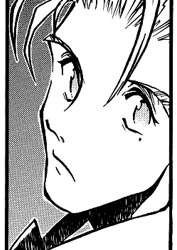
...but even by the time this happens, Wolfwood has already lowered his gun. He's decided not to pull the trigger, not because of an immediate threat on his life, but because... well, it's Vash.
Wolfwood surely knows that if he pulls that trigger, he catastrophically fails his mission, and whatever consequences might await him on the far side of such a failure aren't going to be anywhere near pleasant. But it doesn't seem like it's fear of Knives that makes him lower his gun. At the very, very least, Wolfwood knows no one stands a better chance at taking down Knives, but he also knows Vash. He's seen Vash's fake smiles and knows his real ones. He understands Vash's ideals despite very much not wanting to and not knowing how he could possibly accept them for himself. He's fought side by side with Vash, and been standing at his back since day 1.
And before this night is out, only a few minutes after pulling a gun on Vash, Wolfwood's right back there again, moving in tandem with Vash, being a human shield so they can accomplish Vash's goals together.

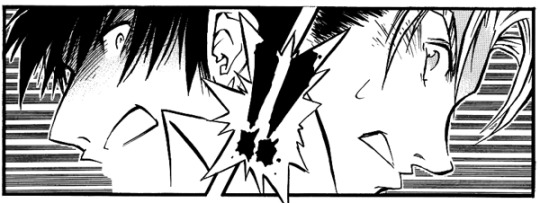

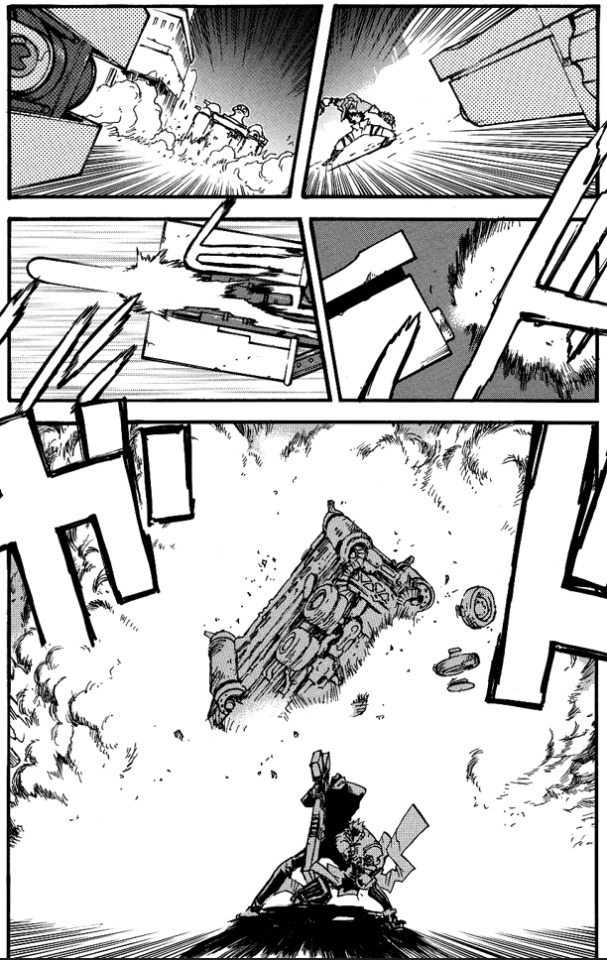
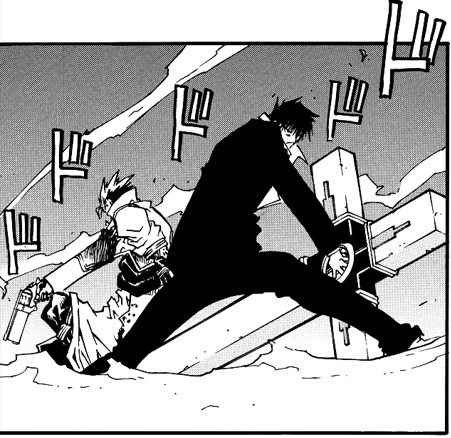
It's only when the fight comes to a close that Wolfwood realizes that's what he's been doing. He didn't put any thought into falling in step behind Vash, didn't dwell on the fact that Vash trusted and moved with him during the fight. It's only afterwards, when they stop to catch their breath, that he realizes Vash hasn't looked his way through the whole battle. That Vash didn't need to look his way through the whole battle.
Not only did Vash trust Wolfwood at his back, but he knows Wolfwood well enough to move intuitively around him, not hesitating and always understanding what Wolfwood's about to do. And at that moment, Wolfwood realizes two things:
First, that there's no way Vash didn't notice when Wolfwood pointed a gun at him. If Knives could figure it out while half dead and barely knowing Wolfwood, then Vash, who's awake, alert, and has spent plenty of time with Wolfwood, can surely figure it out.
And second, that when he's fighting back to back with Vash, nothing else really matters. All his (quite legitimate) fears about what Vash is and how dangerous he can be, about Knives, about finishing his job, about what he himself has become... they all melt away. He's where he needs to be, where he should be, and that's all there is to it.
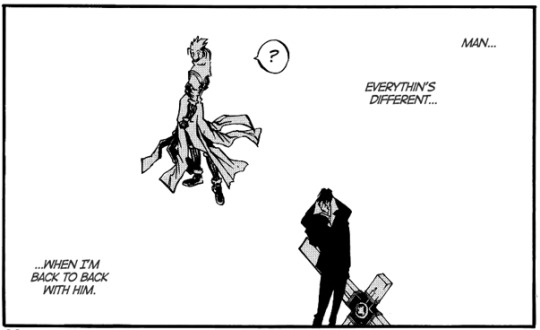
#vash the stampede#nicholas d. wolfwood#vashwood#(you don't have to ship them to see the connection between them here)#trigunbookclub#trigun maximum#volume 6#manga spoilers#manga analysis#character analysis#pancake thoughts
1K notes
·
View notes
Text
Okay, but let's talk for a second about accessibility in M!IK's Netherworld.
First of all, I love, LOVE, that the characters in this manga are so heterogeneous in size and shape.
I mean, look at MeiMei, they're as big as one of Amduscias's foot, and still taken very seriously :')
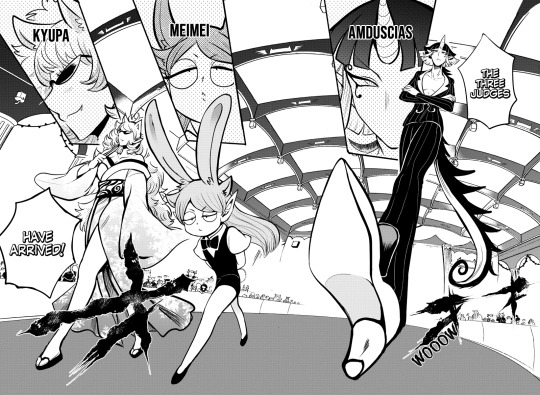
Tbh it kinda makes most other series look pretty boring - and I like it this way, the real world is heterogeneous and media should be to (imo).
With that said, different shapes can be treated very differently, right? Say, think about making fat people pay for a bigger seat instead of making bigger seats where everyone is more comfy... Weird right?
Specifically this panels really hit me:

It low-key sent me into a spiral, not gonna lie.
"So, we are literal demons and technically we live in a ruthless world, but also we think about the needs of everybody and accomodate accordingly, because why wouldn't we"
And that's not it! For instance, not all demons have tails, but all Babyls uniforms have holes for them, and who doesn't have one simply carries on with their life. (Also, the freedom to customize them... Top notch. And you can mix and match like Opera did, or wear a different one like Azz and Ameri, so no real binarism either ♡)
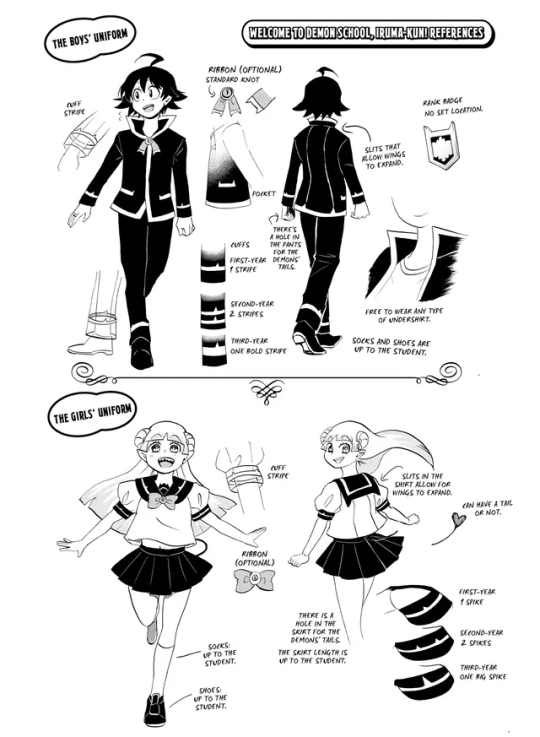
Honestly, if this is how the Netherworld is, I may just start to summon random demons and ask to be brought there, it's worth a chance if you ask me
#mairimashita! iruma kun#mairuma#manga#manga analysis#iruma suzuki#clara valac#valac#iruma#m!ik#welcome to demon school iruma kun#mairimashita iruma kun#welcome to demon school#accessibility#dali-sensei#amduscias#m!ik meimei
973 notes
·
View notes
Text
I got caught up with the Golden Kamuy's author new hockey manga, Dogsred, and I also took the opportunity to start reading through Noda's old hockey manga that got cancelled early on, Supinamarada.
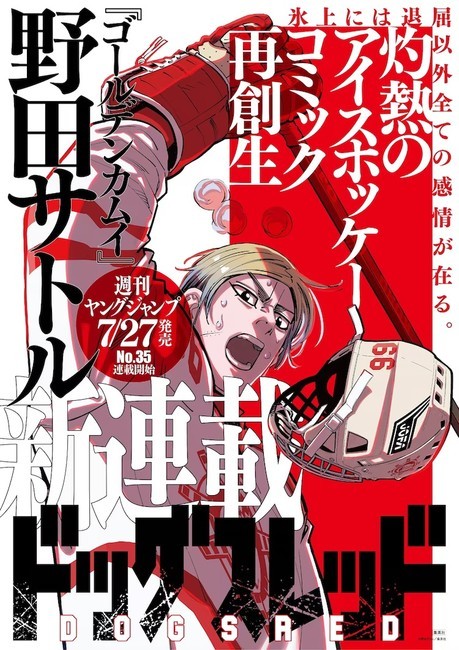
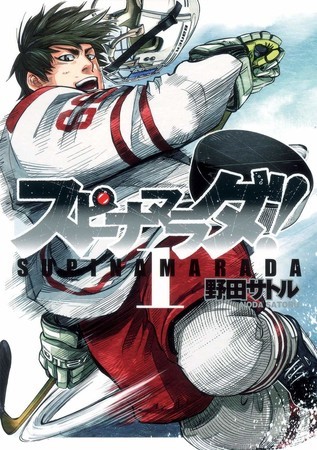
For those unaware, Dogsred is effectively a do over of Supinomarada now that Noda has enough clout from Golden Kamuy to tell the hockey story he wanted with out fear of cancellation. Dogsred has the same premise, same characters, and same basic events to Supinomarada, but obviously Noda has changed as a story teller and manga artist since doing all of Golden Kamuy, and it's super interesting to see that side by side.
For one Dogsred is way more expedient, it manages to get through the story intro and the first hockey game in 8 chapters whereas the old series took 13. And I think one way in which Dogsred achieves this is by massively compressing the way information is delivered. This is super obvious in the first chapter of each series, in Supinomarada ch 1 there are a ton of flash backs and flash forwards between the lead up to inciting incident of the plot, the aftermath of that incident, and the tragic back story and takes about 15ish pages to set up the initial plot premise; the protagonist, Rou Shirakawa, is a teenage figure skating prodigy, before the series starts his single mother died in a car crash after falling asleep at the wheel due to exhaustion, and now Rou is competing in what might be his last figure skating championship because as a child he will no longer be able to support himself.
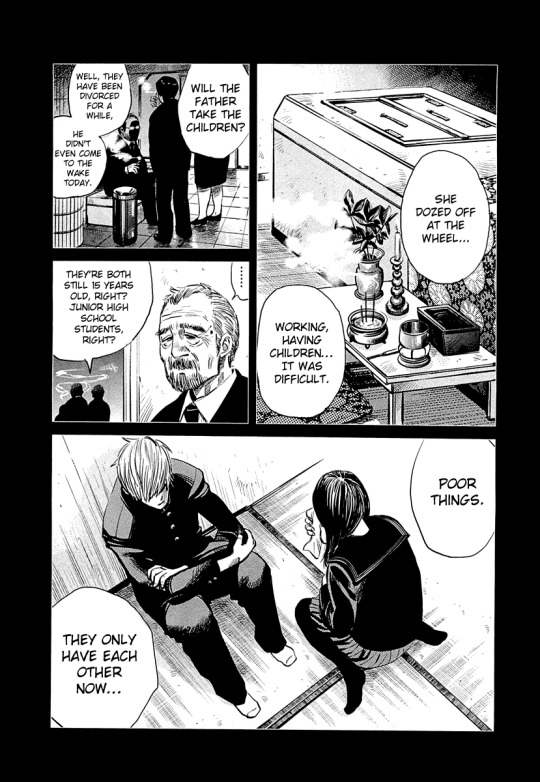
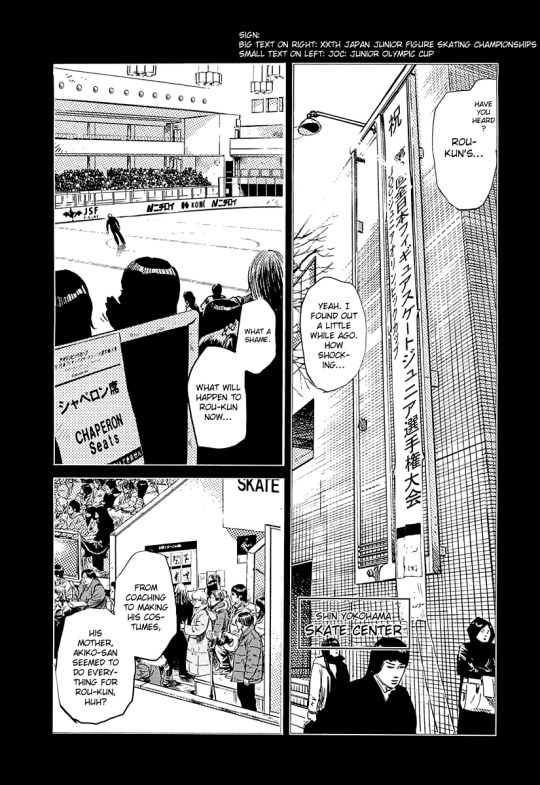

Dogsred is significantly more direct and just has some random background characters say all that shit and conveys all that same information and more within about 5 pages.
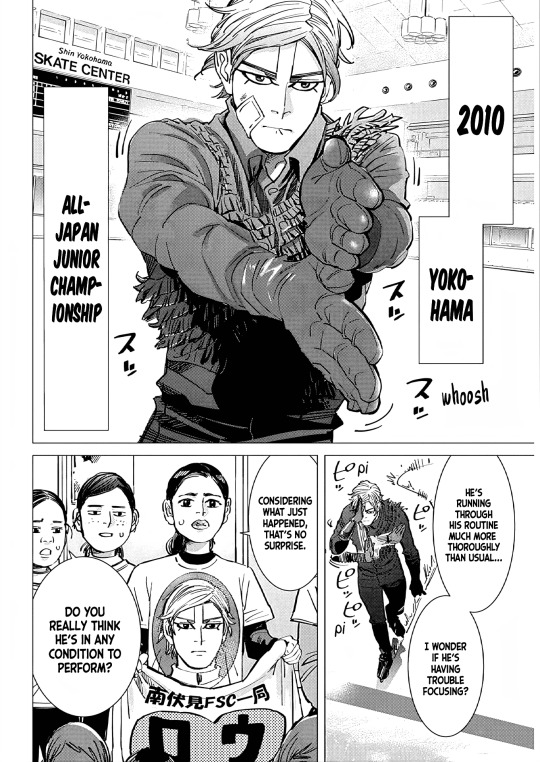
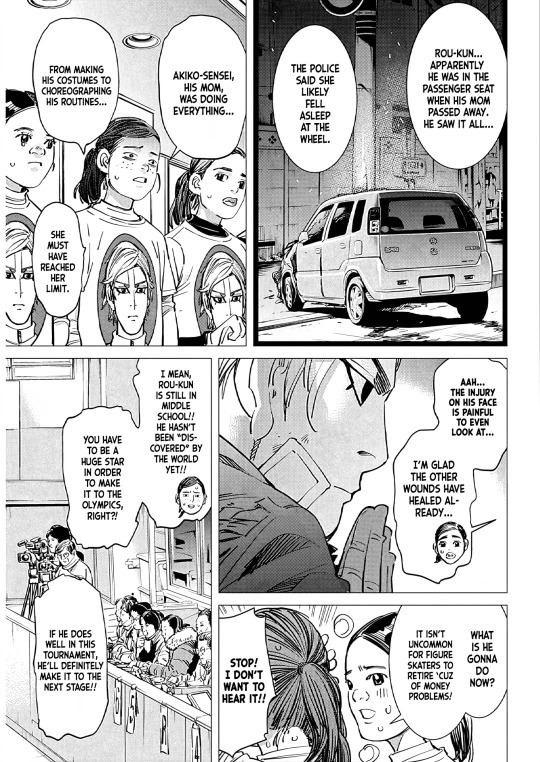
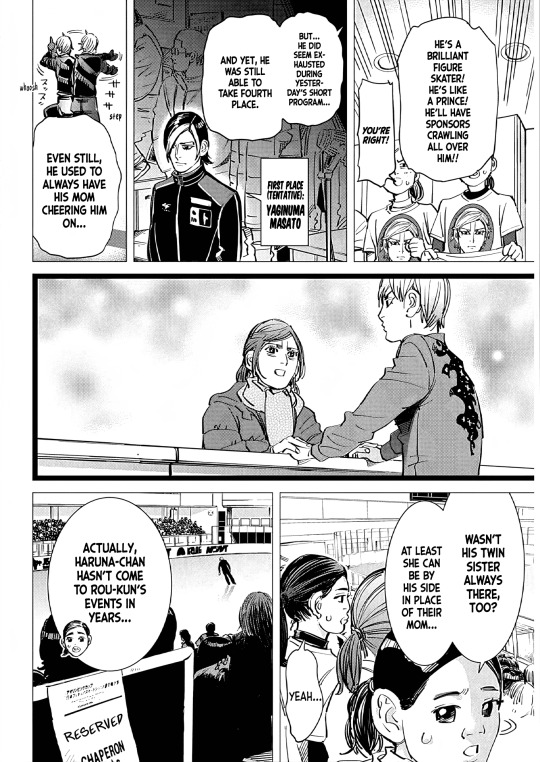
Dogsred also lets it's art do a lot more heavy lifting in regards to storytelling. The single panel of a car crashed into a pillar is way more dire and evocative than a whole page of a generically sad funeral, and we even get to see the dead mom in this one. I also find the handful of panels where Rou doesn't actually speak are really effective at setting up his character and mental state through expression and body language, and that's gonna be true throughout the series. Dogsred Rou is much more of a weirdo goofball than the Supinomarada version and he's got a ton silly little expressions and mannerisms in the style of the freaks from Golden Kamuy and it's lot of fun.


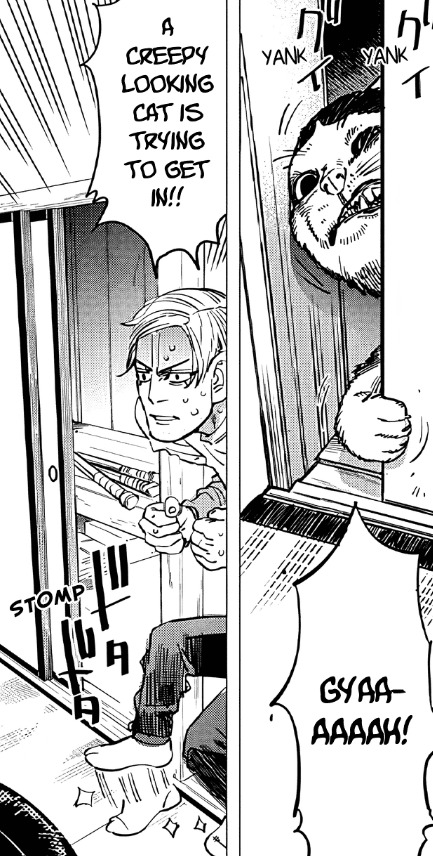

Overall it feels like a way more confident manga than Supinomarada. Noda isn't trying to over explain things to make sure the reader understands every single detail of the plot or the rules of hockey. He's getting the details on the page really efficiently, usually while also working in a gag, and going harder on the aspects that are the big draws for bombastic sports manga, like the expressiveness of the characters and the dynamic sports action.
It's super cool to see how Noda has evolved as a manga artist and storyteller with Golden Kamuy in the interim and I'm really excited to see him get to tell this story he's been holding on to for a decade.
#dogsred#supinomarada#supinamarada#golden kamuy#satoru noda#manga#sports manga#ice hockey#media analysis#manga analysis#valensa talks
221 notes
·
View notes
Text
Orihime Inoue: A Case Study in Shounen Genre
Orihime Inoue from Bleach is often perceived by fans as the "damsel-in-distress" and "designated love interest" in the shounen genre. However, this perception overlooks the complexity of her character and the psychological factors that contribute to her portrayal.
Self-Doubt and Insecurity


Orihime struggles with her insecurities, which are deeply rooted in her traumatic past experiences, particularly being bullied for her hair and the loss of her brother. Growing up in a household where she was mistreated by her abusive parents, Orihime found solace and stability in her brother, Sora. However, his untimely death in a car accident shattered her sense of security and left her emotionally vulnerable.
Living alone in Karakura Town, supported by a distant relative under the condition of maintaining good grades, Orihime bears the weight of her past trauma while navigating the challenges of everyday life. Despite her academic success, she grapples with feelings of inadequacy and uncertainty, haunted by the specter of her past and the loss of her loved ones.
Orihime's self-doubt and insecurity manifest in various aspects of her life, from her relationships with others to her own sense of worth. She often second-guesses herself and hesitates to assert her needs or desires, fearing rejection or disappointment. This can lead to her actions being misinterpreted or overlooked by others who fail to grasp the depth of her emotional struggles.
Reluctance to Express Feelings: Throughout the series, Orihime often hesitates to express her true feelings, particularly towards Ichigo. She harbors romantic feelings for him but struggles to convey them openly due to her fear of rejection and uncertainty about how he may perceive her.
Questioning Her Worth: Orihime questions her own worth and abilities, especially in comparison to her peers. She often doubts whether she is strong enough or capable enough to make a difference in the battles they face, despite her evident bravery and determination.
Seeking Validation: Orihime would've sought validation from others as a means of bolstering her fragile self-esteem. She often looks to Ichigo and her friends for reassurance and approval, seeking validation of her worth through their acceptance and acknowledgment.
Feeling Like a Burden: Orihime struggles with feelings of inadequacy and guilt, believing that she is a burden to those around her. She internalizes a sense of responsibility for the hardships faced by her friends and allies, feeling guilty for not being able to do more to help them.
Self-Sacrificial Tendencies: Orihime exhibits self-sacrificial tendencies, often putting herself in harm's way to protect others. While her bravery is admirable, it also reflects a deep-seated belief that her own well-being is of lesser importance compared to the safety and happiness of those she cares about.
Kindness and Helping Others
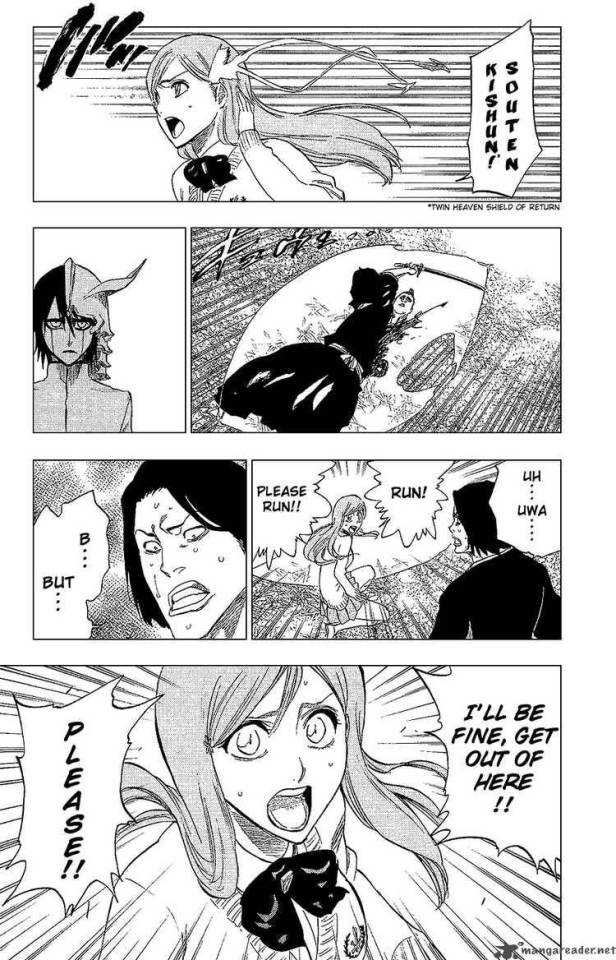
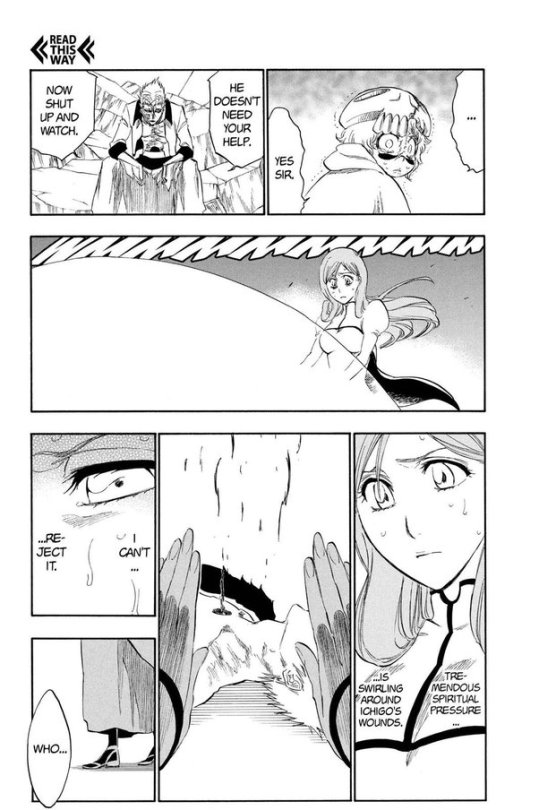
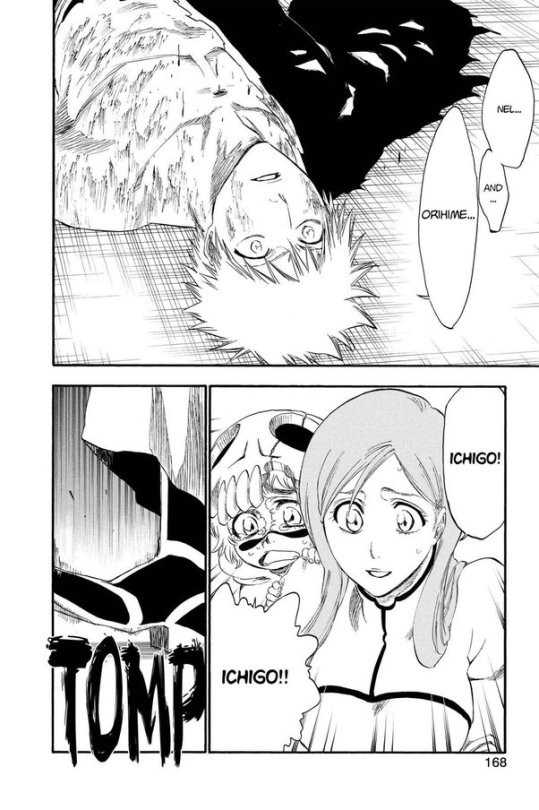
Orihime often puts others' needs before her own and goes out of her way to make people happy, even at the expense of her own well-being.
Throughout the series, Orihime often prioritizes the well-being of others over her own, particularly in her role as a healer and supporter. She uses her abilities to heal injuries and provide emotional support to her friends and allies, even placing herself in danger to ensure their safety. Orihime frequently makes personal sacrifices for the sake of others, demonstrating her selflessness and willingness to put their needs before her own. For example, she volunteers to accompany Ichigo and his friends on dangerous missions, knowing the risks involved but choosing to help them regardless.
Orihime's people-pleasing behavior is rooted in her desire for acceptance and validation from those around her. She often goes above and beyond to make others happy, seeking approval and affirmation as a means of feeling valued and appreciated in return.
Feelings of Love
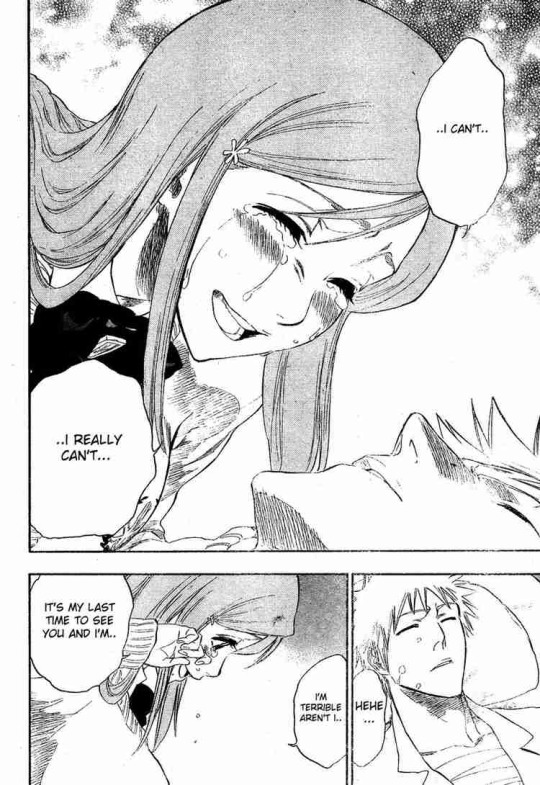
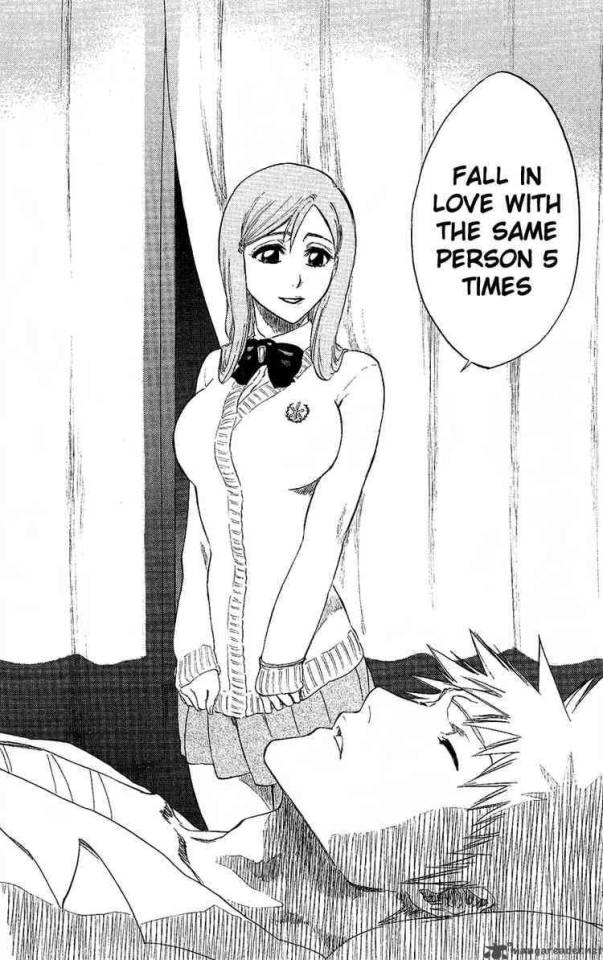
Is anyone else bugged by the fact that Orihime has so far not actually confessed to Ichigo or given him any further indication of her feelings since her saying goodbye to him while he slept?
Orihime harboured romantic feelings for Ichigo throughout the series, but struggles to express them openly due to her own insecurities and fear of rejection. Her love for Ichigo is evident in her actions, such as her unwavering support for him during battles and her willingness to sacrifice herself for his sake.
She might've feared that confessing her feelings to Ichigo could jeopardize their friendship or lead to rejection. This fear of rejection could stem from her past experiences with loss and abandonment, causing her to hesitate to take the risk of confessing her feelings openly. Orihime's insecurities could also play a role in her reluctance to confess her feelings to Ichigo, since she struggled with feelings of inadequacy and unworthinenn, leading her to question whether Ichigo could ever reciprocate her feelings.
Orihime's admiration for Ichigo as a hero figure may lead her to prioritize his well-being above her own desires, causing her to suppress her own emotions for the sake of his happiness.
Misinterpreted Jealousy


Orihime's jealousy towards Rukia, as described, seems to stem from her perception of Rukia's ability to pull Ichigo out of his depressive state during a difficult time. Orihime's statement about feeling "useless" suggests that she struggles with feelings of inadequacy and low self-esteem. She truly believed that she was unable to have the same positive influence on Ichigo as Rukia, leading her to doubt her own worth and contribution to their relationship.
Why Orihime Deserved Her Happy Ending?

Orihime's happy ending in the final chapter of Bleach brings her full circle, providing her with the companionship and love she longed for throughout the series. By marrying the man of her dreams and even starting a family with him, Orihime finds the fulfilment and connection she craved, no longer alone in the world.
Despite the trauma and hardships she faced, Orihime remained hopeful as she never gave up on the possibility of finding love and happiness. Her marriage to Ichigo and the birth of their son Kazui represent the culmination of her dreams and desires, marking a new chapter in her life filled with pure happiness.
#bleach#orihime inoue#bleach orihime#ichigo x orihime#bleach manga#anime and manga#manga analysis#shounen#shipping#bleach ships#relationship#couple#anime couple#ichihime#ichigo kurosaki#bleach ichigo#ichigo#pro ichihime#orihime#pro orihime#character writing#character analysis#inoue orihime#orihime kurosaki
135 notes
·
View notes
Text
"Ania" is the closest to an identity reveal.
Chapter 90.1 Spoilers!
I know that this analysis is a stretch, but hear me out.
Based on my post, A Linguistic Analysis of the Spelling Names "Ania" and "Anya", I think this is the closest thing to how the Forgers would respond to anyone having an identity reveal.
When Loid asks Anya if her name is spelled, "A-N-Y-A", Anya says okay. She doesn't question it and accepts that name because her papa gave it to her. This is poetic because a fake man gives a fake name to his fake daughter.
So, Loid gives her a "mask" to be part of the fake family--the Forgers. In a way, he reaffirms her identity because that's how her name is spelled on official documents. So what you are on paper, you should stick to be.
Meanwhile, Yor carves out Anya's name as "ANIA". She doesn't seem to question the spelling, whether or not she is academically limited, she accepts the name "ANIA" on the plaque. She only changes it to "ANYA" when Loid most likely tells her off-screen. (The reason I believe that it's Yor who fixes it is because the penmanship is the same. The only difference is that "ANIA" has some messy lines when she carved her name).
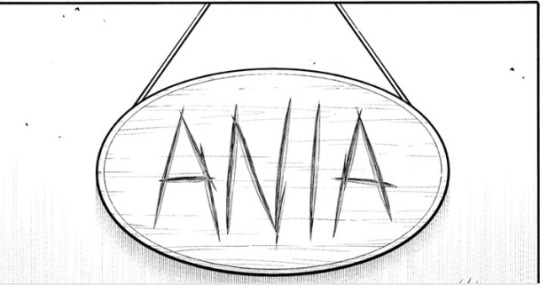

So what this tells me is that Loid will avoid any possible identity reveal and re-affirm what is on paper. Yor would most likely embrace her family if they were revealed. Ania, would probably be relieved and happy.
#spy x family#spy x family spoiler#spy x family manga spoiler#spy x family chapter 90.1#sxf#sxf spoilers#spy x family short mission 11#spy x family reveal#TwiYor#TwiYor reveal#Thoughts#character analysis#manga analysis#thoughts on how the characters would react to a possible reveal#twilight#loid forger#yor forger#yor briar#analysis#thorn princess#anya forger#scarlymadeathing#scarlydidathing#scarlywroteathing
121 notes
·
View notes
Text
Why is it the War Devil?
Obviously, I am fascinated by the concept of the War Devil. There is a way in which her presence in the story is uniquely Japanese. Since WWII, the question of how to process the Empire’s defeat has hung over Japanese society. On the conservative side, there is a long project to minimize the realities of the War, especially atrocities committed by the Japanese Imperial Army. Alongside this, there is the concerted effort within the legislature to repeal Article 9 of the constitution, the article which forbids the Japanese government from raising an army. On the left, there is a desire for genuine reconciliation and strong support for article 9. However, the effort has not gained much of a foothold. Japan is, much like the United States, a strongly conservative country.
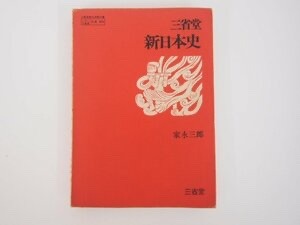
For example, when the historian Ienaga Saburo wrote his textbook “New Japanese History” for public schools in 1953, the government initially approved his manuscript, but when he resubmitted a revised version two years later, they demanded that 216 revisions be made. Revisions included minimizing the Rape of Nanking, adding a mention of public support for the Russo-Japanese war, etc. Straightforward government censorship of established historical fact.
Ienaga sued the government for damages arguing that he was protected by Article 21, the right to free speech. Note: his book was not a state standard. It was simply one of many textbooks available for use by schools. A district court ruled that the government’s demands didn’t constitute censorship, but did constitute an abuse of authority and granted monetary settlement. An appeal to the High court rejected the monetary settlement, and the Supreme Court upheld the appeal.
In other words, the Japanese Government was granted the right to dictate the facts of history “for the public good” in the words of the rulings. Realities of war were erased from the public consciousness with the intent to control the narrative around the Fallen Empire. And the state reasoning was a paternalistic appeal to the greater good of humanity. If this reminds you of Makima’s plan in part one, I am sure that is not a coincidence.
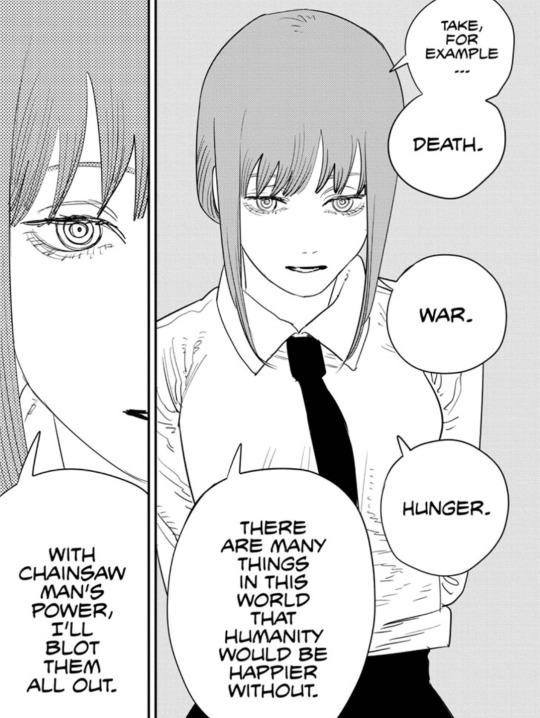
This is a metaphor that I think was broadly missed by the international audience. The idea that War should be forgotten for the sake of humanity, this is the ideology behind historical revisionism. Fujimoto is looking directly at the way that political power in Japan is used to manipulate public understanding of history. Pieces of the past are erased, eaten, and forgotten.
This is why I don’t lend much credence to the idea that Chainsaw Man actually modifies the fabric of the universe somehow when he eats a devil. It is not that the world changes, it is that people forget about it. It’s not that our forgotten sixth sense was deleted. We just forgot it used to exist. It disappeared, perhaps as a part of Chainsaw Man’s attack. And then we forgot.
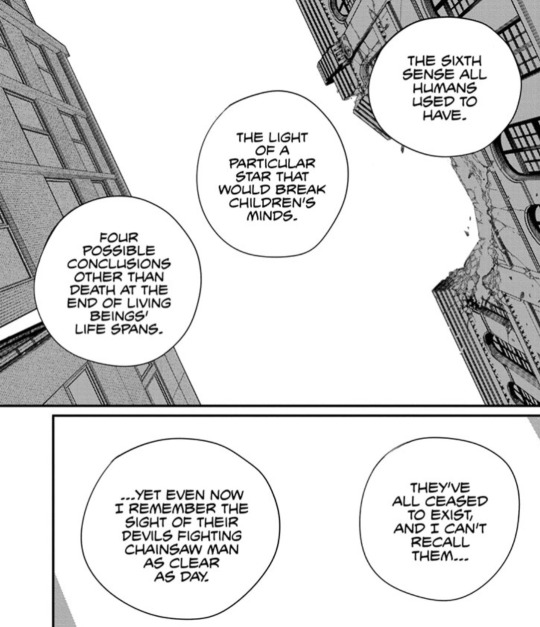
The main reason I think of it this way is because of the parallel with historical revisionism. Right now in Florida the state government is attempting to erase the suffering of African slaves brought to America from the school curriculum. If they maintain this for three generations, no one in the state of Florida will know of this true part of history. It will be forgotten. Humanity in Florida will have forgotten a part of slavery. We don’t need supernatural mechanics to explain historical ignorance. This happens all the time.
Yoru describes this phenomenon in more detail: “War became a thing of books and movies.” Yoru became weakened as humanity became less afraid of war. Parts of the war that really happened are not gone, but have been consigned to unreality. They exist only at a distance. It is only one step further along this axis until they are completely forgotten, until they aren’t thought about at all.
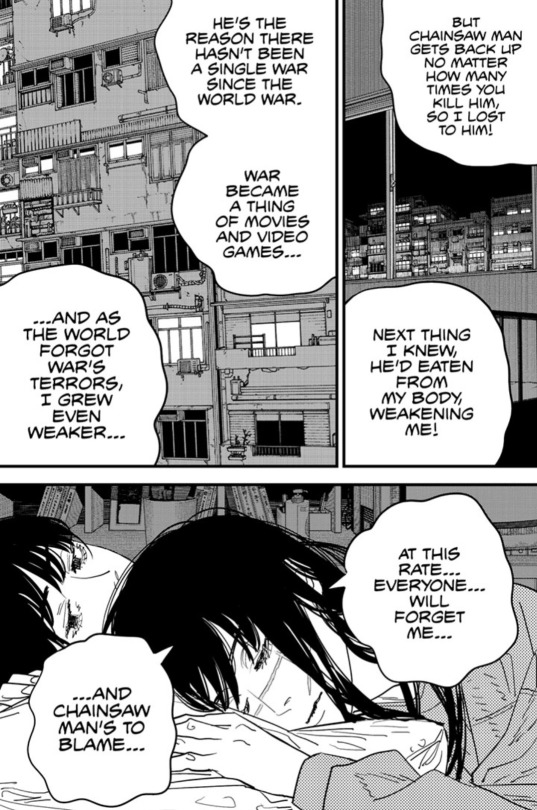
This idea of forgetting War is directly relevant to the political conflicts around Article 9. This conflict is split as I mentioned, but the reality of the situation is more complex. During the occupation, the US Government directed the drafting of the new Japanese constitution. In a real sense, Japan was literally Americanized. The text of Article 9 reads:
Aspiring sincerely to an international peace based on justice and order, the Japanese people forever renounce war as a sovereign right of the nation and the threat or use of force as means of settling international disputes.
In order to accomplish the aim of the preceding paragraph, land, sea, and air forces, as well as other war potential, will never be maintained. The right of belligerency of the state will not be recognized.
This is part of Chapter 2 in the Articles of the Japanese Constitution. Other chapters contain multiple articles. This is the only article in chapter 2 which is titled “Renunciation of War.” To date, Japan is the only country in the world to include a renunciation of war in its constitution.
Of course, Article 9 doesn’t exist out of the kindness of the Japanese people’s peace loving hearts. It exists because the US military thought that the Japanese people were so intrinsically bloodthirsty, that if they didn’t dismantle the empire and remove their ability to raise an army, there could never be peace.
That said, Japanese politicians were involved in the drafting of the constitution as well. Since the war began in China in 1928, a significant faction even among the hawkish types were exasperated with the boneheaded aggression. But the fascists had control of the Emperor, the key figurehead. Once that was lost, cooler heads who were open to the idea of a peaceful Japan stepped in.
So Article 9 starts with this complex identity. On the one hand, it is an imposition by the occupying force, on the other hand, it is a reconciliation within Japan around mistakes the nation made. This remains the case going forward. Because soon after the occupation ends, the Korean War begins.
America, having secured a foothold in the region, realizes that militarily neutering their nearest ally may have been a tactical mistake. But they also still don’t really trust the Japanese government. So they make a move. The US signs a controversial security-treaty with Japan that creates the “National Security Force” to act as a military police. Japanese conservatives then use this precedent to begin building a military under the premise of it being for “self defense.” Thus the JSDF, Japanese Self Defense Force, is born. This was all done with explicit American support.
The American’s didn’t want to team up with the JSDF per se. They wanted Japan to manufacture weapons to create a short supply line towards the Korean front. The creation of the JSDF gives the Japanese government permission to permit manufacturing of military machinery, which was originally taken to be forbidden by Article 9.
Since it’s founding, the JSDF has gradually crept further and further towards active military activity. The final line was crossed in the Iraq war. At the behest of George W. Bush, Prime Minister Koizumi approved a battalion of Japanese soldiers to act in conjunction with the US military for the invasion of Iraq.
This occurs in 2004, in the wake of the 90s. Japan re-enters war in a real way. At this point, article 9 is essentially window dressing on a country which has what amounts to a fully functional military force. But, the existence of article 9 creates a public perception of Japan as being removed from war, even as it actively participates.
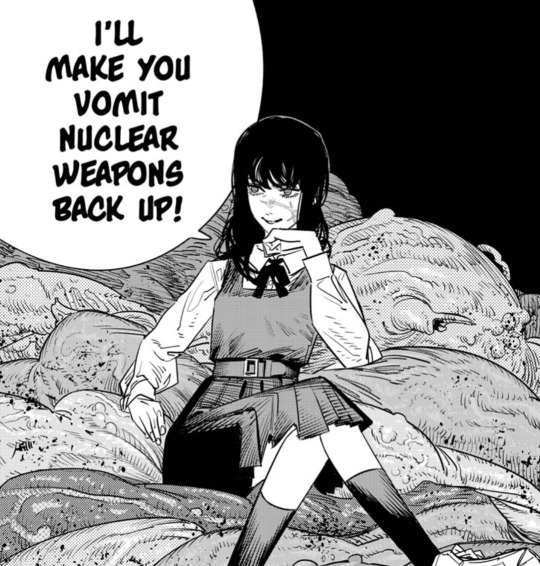
You can see now why when Yoru appeared in chapter 98 I was immediately excited. The idea of the War Devil coming back is a stab at the powers that be trying to paper over their militaristic intentions with political rhetoric. Conservatives are currently moving to repeal article 9. This was one of Shinzo Abe’s major objectives. But he failed to achieve it.
So the struggle continues under the current leadership. And in that context, Fujimoto is placing War front and center. War that has been forgotten but will come back. War that, should she return to full power, will turn legions of young men into weapons.
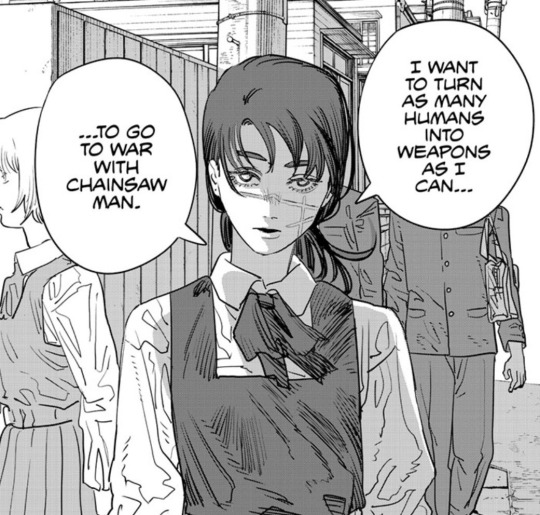
It’s a subtle but also daring message. The debate plays out in politics but is notably absent from public discourse. Japan is different from American in that political conflict doesn’t dominate its media landscape. Generally speaking, the media is running cover for the government.
So to see someone go after this idea of forgotten war, of war coming back from a weakened state, and to highlight the latent threat it poses, is quite refreshing. Once again, Fujimoto manages to subtly weave a cogent political message into the threads of his story, not necessarily by trying to push a particular narrative, but simply by reflecting in his work the political realities he sees in his society.
#chainsaw man analysis#japanese politics#Yoru#war devil#chainsaw man#manga analysis#ienaga saburou#war#Japanese self defense force#jsdf
160 notes
·
View notes
Text
I think the boss is kind, strong and beautiful

This image is edited
Reading the earlier chapters again with the idea of revaluing Doumeki’s maturity, made me realize how little I should have taken things at face value without questioning them. Since Doumeki was called “stupid” a lot, or even “hachiko” like Nana Komatsu, I just thought that he was meant to be a little naive, a fish out of water, new to the yakuza life. But that is a big mistake, considering that he was in the police and he spent time in prison, but mostly he had to grow up abruptly from his attitude to take life passively the moment he beat up his father. I talked about it in a previous analysis. Other characters expressed those thoughts about Doumeki, that he was strait-laced and not clever enough to distance himself from Yashiro or too infatuated with him to the point of enduring everything his boss asked. That’s only in part true, but not quite how I think we are supposed to interpret him when we look closer. The scene I am going to analyze tells me a different and interesting story and also discusses in a very subtle way a theme that I feel it is more relevant than ever: homophobia.
In chapter 6 Doumeki brings Nanahara back to the clinic - we only can assume that he had it out again with some of Ryuuzaki’s underlings. While Kageyama removes his bandages, Kuga comes in. It’s the first time Doumeki meets him. Up until this point Doumeki has been observing and collecting information quite discreetly and he knows two things: that Yashiro is in love with Kageyama, but has never slept with him (Misumi’s big mouth supplied that last bit). The assumption could likely have been that the doctor is straight.
[Saezuru is a bl manga where straight people exist and are the majority - or at least men don’t make an habit of sleeping with each other - if we read it closely enough and from a realistic perspective, and if we pay attention to how homosexuality or sex between men is actually treated and judged by most characters. At least that is how I am reading it, I am not looking at these characters to pair them together, as my personal preferred approach].
Meeting Kuga at this point is another important piece of the puzzle Doumeki is putting back together silently, in his mind, and discreetly. In this part of the story, Doumeki does what he is told or ordered, yet he is collecting pieces of information and building a strategy for his current goal or desire: to keep his place close to Yashiro.
Kuga-kun is an interesting character. He was able to beat Nanahara, and that alone is quite impressive (I believe they both know how to throw punches in a professional manner). He is lively and doesn’t spare words about his dislike for Yashiro, speaking about him or to him impolitely and without honorifics. To Doumeki he says: “I don’t really like him, you know. I have no idea what he’s thinking, he is a pervert. In all honesty, you hate him too, don’t you?” and Doumeki here has an interesting reaction. In a deadpan way he voices his opinion: “I think the boss is kind, strong and beautiful”. The first reaction to this is laughter and we are probably meant, as readers, to participate a little in making fun of Doumeki’s supposed naivety. Kageyama tries to make Kuga hold back but at the same time: “I understand how you feel, but don’t talk about it now…”. While Nanahara is ready to protect Yashiro’s supposed honor by challenging Kuga to have it out again. Kuga laughs: he clearly expected that a serious looking ex cop would secretly hate someone like Yashiro, not only a homosexual, but also flaunting it. [I am simplifying Yashiro’s sexuality here for the purpose of staying on topic, this is how these characters are seeing it mostly and reacting to]. The entire thing is half played for laughs, while also displaying Kuga and Kageyama’s homophobic tones. Doumeki’s statement is met by disbelief and embarrassment, Kuga even questioning his sobriety. But seriously as ever, Doumeki doubles down: “I respect the boss. Is that so funny?”. Yoneda dedicates a panel to each person’s individual reaction, Kageyama in shadow, subtly looking back behind his glasses at Doumeki, perplexed or troubled by his words. This three panels, when we look at Kuga, Kageyama and Nanahara being silent, give a sense of pause and suddenly the whole atmosphere changes and Kuga apologizes to Doumeki. An understanding has been reached, something has passed between these men in this room.
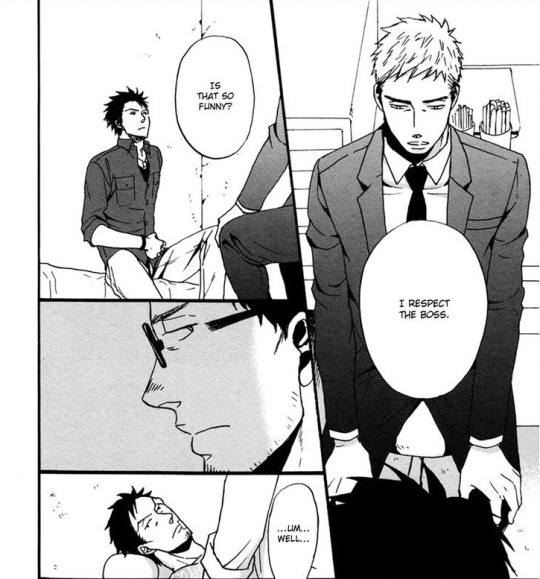
Now Kuga is open and friendly to Doumeki and wants to know his name. He introduces himself properly and says something really really relevant for the point Yoneda aimed to: “I’m Kuga. I work as a bartender or club staff. Oh and I’m also this old man’s boyfriend “. Even Nanahara didn’t know that. Kuga chose to out himself and Kageyama to Doumeki. This is seamlessly done, it is subtle as a coming out scene, built organically and probably would pass under the radar very easily. But I think that is how people really would interact in the world Yoneda Kou is portraying. I already wrote a little about Kageyama, in my opinion one of the characters that displays his internalized homophobia more bluntly, especially in his open contempt for Yashiro’s “sense of morality” or “dangerous lifestyle” [his words, not Yoneda’s personal view nor mine]. Yashiro brought Kuga into the doctor’s life and made him confront a side of him he wanted hidden, yet at the same time Kageyama keeps thinking that homosexuality should be kept discreet, behind closed doors, and that Yashiro is only looking for trouble by being open about it.
The scene ends and we go back to a pensive Yashiro. In the end of the chapter we are in his POV and discovering that Kuga, Kageyama and Doumeki went out to drink together. It’s an interesting development, significant because it means that the couple feels comfortable now in front of Doumeki and they can be relaxed and be themselves and this opens the possibility for Doumeki to speak to Kageyama and to ask openly about his relationship with Yashiro.
I think this aspect was worth analyzing and I am sorry 😞 it is more long than I wanted. Also I am not putting a lot of images in my analyses out of respect for the copyrighted material and Yoneda Kou. It is still available easily and I think this type of deep dive into Saezuru only makes sense if you have read it entirely and are a fan, which implies that you have a copy of the manga. To be continued…
#saezuru tori wa habatakanai#saezuru analysis#manga analysis#yashiro#doumeki chikara#don’t stay gold#yoneda kou#eri reads saezuru#homophobia as a theme in bl manga#coming out scene in bl manga#yoneda Kou treating topics seamlessly and organically is worth praising#queer coding characters in manga isn’t really a thing since japan didn’t make a habit of policing representation of sexuality in media#please reach out to me if you find any mistakes
34 notes
·
View notes
Text
Manga With Me: Obscure Head Canons (and Hypotheses) You’d Probably Develop When Reading the JJK Light Novels, Pt 1
For an anime with literally no filler episodes 🥹... the first light novel provides a brief insight into the days before (and behind the scenes of) the trauma. As someone who thrives on the misery of being a JJK fan, would the experience be complete without them? The answer doesn't matter because everything you need is below the jump! I saved my biggest theory for last so hop to the end for it.

⚠️ Spoiler Warning for Jujutsu Kaisen Summer of Ashes, Autumn of Dust and season 2 of the anime (manga spoilers are vague at best).
Head Canon: Gojo is the Riddler Purely For His Own Entertainment ✨
As someone who can process things the way a Six Eyes holder probably can, there’s no way he allows Yuji and Megumi to get the drop on him during their surveillance of sensei on his day off. But he takes them around (at a distance) doing silly things like record stores and maid cafes because I think it prompts them to enjoy things they wouldn’t. Especially Megumi. It’s kind of sweet, both their inherent curiosity about him but also lonely the way that he explores his whims so far removed from everyone else. It really highlights that “Who is Gojo Satoru?” question when you realize even Megumi’s interest was lowkey piqued at the possibly knowing a bit more about Gojo.
In the second story, Gojo speaks in straight up nonsense (think Mad Hatter) and it is no wonder when he's working alongside the most straight laced sorcerer there is, Nanami Kento. To a degree, I wonder if it’s genuine chaos spilling from his head or if he knows, after years of pushing Nanami’s buttons, how to precisely drive him up a wall. I question whether it's for his own entertainment or to his own alienation. Maybe Geto really was the only one who could follow the winding thread of Gojo’s thoughts.
Head Canon: Gojo Secretly Worries About Nanami
I think with Haibara’s death and the knowledge he would have made light work of whatever caused it, Gojo makes it a point to join Nanami on missions.. just in case. After all, Nanami and Shoko are all he has left from before. He’s lost many people and, as the strongest, I don’t think that fear is something he’d admit aloud, but its reality is demonstrably what pushes him forward physically and philosophically. In the story where they go on a mission together... it almost seems like an unspoken and uncomfortable understanding between them, the elephant in the room neither want to point out. People around Gojo never wanting to acknowledge how his strength eclipses theirs is rather common which we see with Nanami in this story and even Ijichi later. So while he may make light of this chasm, he still pops in as an unsolicited protector. With grace, he allows Nanami to assume he's just being a nuisance but I really think he takes an ounce of prevention where possible when it comes to the people he cares for. After all, imagine the turmoil if he ever came to realize his absence could make or break another person's survival again.
Head Canon: The Elders Have Always Known, If It Came Down to it, Gojo Would Always Choose Geto
There’s a reason they kept the idea of reanimating the dead a secret specifically from Gojo. In fact, they should probably consider themselves lucky that he was so vehemently disgusted with the curse user capable of such puppetry. I wonder if he experienced hope before allowing the reality of the sham magic to break his heart all over again because, in their secrecy, it seems like they know the lengths he’d go to protect and choose Geto. Geto was allowed to walk the earth for 10 years after his execution was ordered. Maybe they were right to keep it close to the chest. Gojo still saved his body, after all. To what end when he knew a body can run the risk of becoming a curse?
Head Canon: Gojo Saved Ijichi's Life but Condemned Him to Something Worse
Okay so this is kind of a manga spoiler (though I believe the flash back is during the Premature Death/Hidden Inventory arc) but, as a student, Gojo straight up told Ijichi he was weak and should find something else to do so he doesn't get himself killed. So he does. He becomes a steadfast and detail oriented manager which is a critical fixture in jujutsu society but damn, doesn't it just put Ijichi in an ivory tower of suffering? Years pass as he sends first his juniors, then fresh sets of kids into dangerous battle after dangerous battle. Some survive, some don't and all serve as a reminder of his powerlessness. He can cross every "t" and dot every "i" and it still doesn't prevent what happened to Yuji at the Juvenile center from happening. What does that do to one's soul?
Head Canon: Gojo Still Thinks "We Are the Strongest"
As seen with the Premature Death/Hidden Inventory arc, we know that Gojo saw an exponential growth in response to the losses suffered. It seemingly drove a wedge between he and Geto as Geto struggled to grapple with his powerlessness. With his defection, we see where Gojo changes his posturing from "we are the strongest" to "I am the strongest" but in the back of his mind (Alexa, play "Always Forever" by Cults 🫠), we know he still holds a soft spot for his first and last warm spring of youth. At the end of JJK 0, he refers to Geto in the present tense, as his "best friend, [his] one and only." Even after everything, I truly think Gojo leaves space for Geto beside him. This is furthered in the light novel during a story which is placed post Junpei and upon Yuji's return to life at Jujutsu High. Yuji, while still playing dead, helped a kid who had a grade 3 curse that seemed to be resurrecting and, after exorcising it multiple times felt he needed Gojo's assistance. When Gojo refused, he resigned himself to ask Nanamin for help wherein Gojo employed a Teachable Moment (TM).
He approached Itadori, who was hanging his head. "In this world, tragedies too often end in misery, even when it's possible to help. But the problem isn't lack of strength or getting there too late." As Gojo passed Itadori, he patted him on the head without making eye contact. "The main reason it happens is that people forget they have the strength to help."
This was enough to restore Yuji's confidence in his own competence but also sounds informed by what happened between Geto and Gojo in a sense. I interpret Gojo's assertion to center Geto to be the assumed lack of strength (which was most pertinent to how he was advising Yuji) and himself with the poor timing. Ultimately, to Gojo it doesn't matter because he never thought Geto was weak. The insecurity was a product of a situation he failed to reason himself out of, at the time, and it bred resentment within him alone. I don't think Gojo blamed Geto for anything that happened with Riko nor could he blame himself. It simply spurned him to figure out ways to limit his vulnerability in the future. In the face of that loss, Gojo still said they were the strongest and maybe in that moment with Yuji, he was employing a lesson he wished he could have been in a place to tell Geto to quell his festering guilt and grief. You can be strong and still fallible.
Hypothesis: Mimiko and Nanako (and Anyone Else...) Going After Managers is Not a Coincidence
As we saw with JJK 0, Geto's twins were rather merciless in going after the suits who make everything covert about jujutsu society possible. Based on what we knew at the time, the managers provide cover for sorcerers on missions (with curtains, getting them transportation to, providing cover stories) and plug them in with resources as needed. But we begin to realize that managers serve additional purposes. In season 1, we see that they are sometimes part of the investigative force when it comes to getting information around developing situations. With the Shibuya arc and the arc that follows, we see that they are also integral means of liaison and communication between sorcerers and to other points of contact within the community, including windows.
So. Windows are people who can see curses but aren't sorcerers which begs the question, what are managers? As we learn and can infer with Ijichi, who was a former sorcerer in training, managers are people who can see curses and may even be able to manipulate cursed energy. They aren't full blown sorcerers but they aren't completely helpless either. So why go after them?
As we see in the story centered around Ijichi's "boring day" at the office. Managers are sorcerers' only connection to the "human" world. They are what keeps them tethered to their mission in protecting others while similarly upholding the etiquette and traditions around how the rest of the world works. They maintain a very delicate balance of things alongside the supernatural. Without them, you'd have the unchecked ego of teenage Gojo basically just doing as he pleases without curtains or respect to the possible implications of a civilian seeing him work out in the open. To suit Geto's needs during JJK 0, why should sorcerers operate under some guise of hiding their strength for the sake of those who are weak? As to what happens during the Shibuya arc.. imagine the fear, the anxiety. Imagine the chaos! Imagine the curses it would yield.
Hypothesis: Yuji is Still the Main Character, We Just Haven't Seen the Curse that He'd Manifest When Broken Saying it louder for the people in the back
Certain corners of the fandom have largely cast Yuji aside. With the release of JJK 0 and appearance of Yuta, many wonder why Yuta isn't carrying the series. Afterall, his inherent overpowered-ness and ability to copy any technique for sure casts him as the next gen Gojo, right? In the literary sense, we've seen the rise and fall of his story. We haven't seen the last of him by any stretch of the imagination but he is, as we discovered, also jujutsu society royalty. A distant cousin of Gojo's, actually.
Of the main cast of first and second years, Yuji and Nobara are subsequently the only characters who do not have apparent ties to jujutsu society. Nobara, plucked from the countryside, is tested by Gojo upon her initial introduction to the series to make sure she's crazy enough to cut it. Yuji's origin is still a ways from truly coming to light but his inherent strength and the simple ability to house Sukuna and maintain his identity has, in many ways, been indicated to be an anomaly. Subsequently, as the viewer or reader, we know there's more to the story which has yet to come. I won't go into it here given my desire to not spoil the larger manga story but I think laced within the light novels is enough evidence to talk about Yuji and what his power and subsequent threat level is.
Yuji, for all intents and purposes, is an outsider. From what we can tell, he has experienced loss. Most apparently with his grandfather but we also assume he is a victim to the MC syndrome that leaves him orphaned and prime for a journey rife with struggle. He's fifteen with the pure heart of a child despite any previous hardships and just so happens to be armed with the mission to help people.
Yuji approaches the introduction to this new society with the wonderment of a kid finding out superheroes exist. But this naivete, this untempered light, actually has the capability of being something so fearsome when we learn how curses manifest through negative emotions.
In the anime, we see this as Sukuna scratches at Yuji's mental when they realize the possible origin of Tsumiki's curse may have begun killing it's victims when Yuji ate the finger. Mahito employs a similar means of manifesting ill will in Junpei that ultimately also becomes a burdensome guilt that Yuji bears. Countless times in the Shibuya arc, Yuji is forced to witness catastrophic losses of his mentors and friends while he can only stand idly by. The survivor's guilt is compounded by the shame of his own inability to help which only gets worse.
Since Yuji is relatively noble and sincere in nature, he considers these losses personal failures. He takes ownership of any sins against others that Sukuna commits when he is not in control over his body and, subsequently, his spirit takes a beating time and time again. He sought to do good in the world but his ledger becomes increasingly bloody through no means of his own and it weighs on our sunshine character.
It's easy to lend a hand to a child who has fallen, but it's a teacher's job to show a child how to stand up unassisted. It isn't always easy. - Gojo Satoru
The first light novel closes the gap between how Yuji went from training in a basement away from anyone who'd want him dead a second time to being under Nanami's care. While wrapping up Nanami's case, Gojo is uncharacteristically somber in requesting Nanami's assistance. He explains that Yuji requires Nanami's influence as someone who knows human suffering. The losses shared between them are unspoken and are not acknowledged within this exchange but, from what we know, hang as a burden between them. Still, both Nanami and Gojo have continued on as sorcerers somehow, from the grief of their youth into their late twenties. But Gojo gives voice to the concern that, because of Yuji's bravery and altruism, that the reality of what's expected of a sorcerer will one day break his heart if someone with emotional intelligence isn't able to help temper it. They seem to both understand the precariousness of youth and have both been shown to insist in protecting it where possible. This exchange and their mutual understanding is how we have Yuji under the care of Nanamin. It's also where we get the heart rending reminder that "Being a child is by no means a crime," and "You've escaped death many times. But that doesn't mean you've become an adult."
In the last story of the book, as Yuji is reunited with the other first years, he is contemplating a situation he encountered that still lacked resolution. He'd exorcised the exact same demon several times but to no avail. He hopes to enlist Gojo's help but Gojo encourages him to think about the problem more because not everything can be solved by fighting and exorcising when the source of curses is from human emotion. As Yuji races off to resolve the issue that's been weighing on him, Gojo reflects on his responsibility to preparing Yuji for the ups and downs that are sure to befall him.
Itadori's sincerity was a more significant attribute than his being Sukuna's vessel. As a result, trauma had the potential to become a curse more fearsome than anything else, a nasty curse preventable only by confronting one's own heart. Instead of cradling that heart, Gojo could teach it to be prepared. That's what it meant to raise students.
While the story resolves without consequence, we see that Yuji's reflection on the situation is as endearing as one would imagine though still a bit warped. He is galvanized to be stronger, dedicated to providing the help the people need whatever it may be, and to not give those he cares about reason to worry which seems in line with what Gojo was hoping for. But being offset by his consideration for how others feel like Nobara and Fushiguro when he died, it almost feels like he's creating an even larger burden of expectations for himself. This gives rise to Gojo's very real concerns about how far someone can fall into despair, especially someone who is such a beacon of positivity.
#manga with me#manga with me jjk#jjk#jujutsu kaisen#anime#manga#headcanon#gojo satoru#yuji itadori#nanami kento#itadori yuji#kento nanami#satoru gojo#manga analysis#jjk brainrot#jjk theory#jjk conspiracy#sukuna#sukuna's vessel#jjk light novel#summer of ashes autumn of dust#jjk yuji#jjk nanami#jjk gojo#we are the strongest#satosugu#meta analysis#meta#jjk meta
69 notes
·
View notes
Text


These panels actually hit me like a truck. Even "Hikaru" noticed that Yoshiki still has feelings for Hikaru. Yoshiki never talked abt that with anyone bc he knows no one would truly understands and he also knows that Hikaru didn't like him back
He keeps "Hikaru" around with the hope that it'd make it hurt less, but seeing someone with Hikaru's appearance every day and knowing it's not him anymore just make the pain worse
Even if he doesn't understands feelings very well, "Hikaru" loves Yoshiki, he took this feeling from Hikaru and is dealing with it in a totally different way, but Yoshiki doesn't allows himself to love back bc he knows this ISN'T the Hikaru he loved
I love the way this manga talks abt grief and one sided love using horror and supernatural stuff
#i'm sorry if i couldn't make myself clear on some topics#english is not my first language#but i needed to rant abt this manga and those two#someone pay my therapy#the summer hikaru died#hikaru ga shinda natsu#hikaru#yoshiki#manga panels#manga analysis#rant post#mari.txt
44 notes
·
View notes
Text
La Squadra's stands as a metaphor for a individual: one's organism, life cycle and behavior.
"Is there a consistent thematic parallel between all members of La squadra and their stands?"
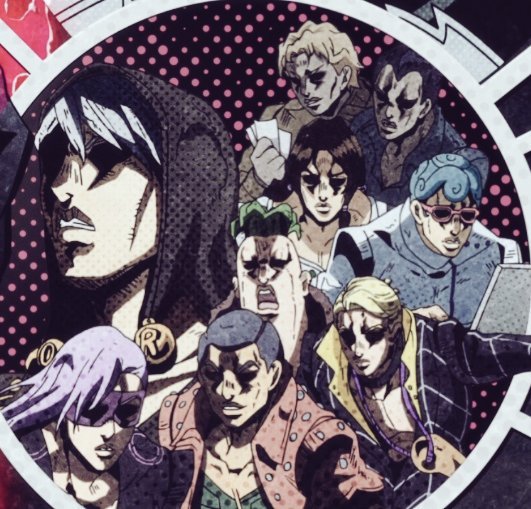



#jjba vento auero#vento aureo#jjba golden wind#golden wind#la squadra#mothtalks#la squadra di esecuzione#risotto#prosciutto#melone#ghiaccio#illuso#pesci#sorbet#gelato#formaggio#manga analysis
62 notes
·
View notes
Text
Knowledge in VNC : About Noé's eyes
So, we all remember that when Noé was very, very young he was injuried in one of his eye right ?
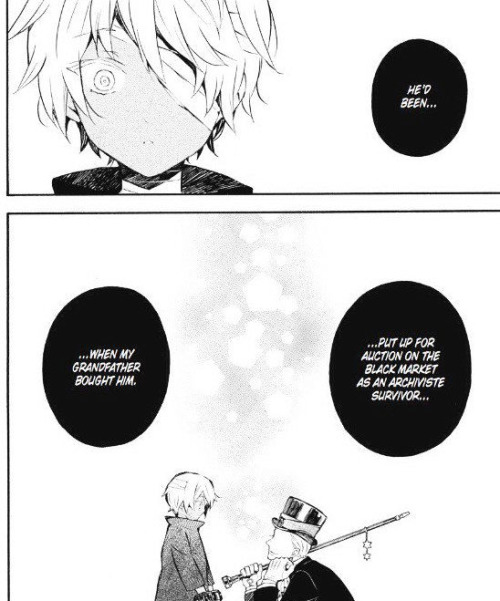
While people wonder why his left eye specifically, I might have the answer to this.
In latin, left is said "sinister" but in french it gave the word "sinistre" which means omnious and therefore lead to countless surpestition of left briging you infortune, on why you should never eat with your left hand, or that the wrong decision is always to choose the thing in the left etc. This comes from the Greek since Roman saw the left/sinister as a sign of good fortune and since VNC is full of latin/french reference it might be why.
Anyway, that answered. I'd like to point out something. In the Opening 1 of VNC, 空と虚/The sky and the void, towards the end of the 1st chorus, those lines are mentionned :
その目に僕は見えるでしょう?But those eyes can see me, can’t they?
You migh wonder why there would be such a focus on vision. Well, for a long, long time vision is associated with knowdlege which is why the word "blind" can have the literal meaning of not seeing things and the figurative meaning of not seeing them in the sense that you are ignorant about it despite the answer being right under your nose.
So to explain this I'd like to use two mythological reference : Oedipus and Tiresias.
Oedipus is know very infamous for giving it's name to something Freud called Oedipus complex, but in Sophocleus's tragedy, Oedipus king, there is an interesting play between the vision and the knowledge thanks to the use of the verb σκοπέω/skopeo which both means to see/to observes and to judge/to think. Hence the play shows us an Oedipus that has the answer to the question he has at the begining reguarding Laios's murderer and the fact that his wife Jocaste is actually his biological mother, but he doesn't see it, he is figuratively blind which causes him to not see in the sense of him making terrible decision and when he finally begin to see the truth, he is crushed by reality which causes him to blind himself literaly, saying that he is now as blind as he used to be at the beginging of the play. I could go on with this due to how interesting this auto mutilation act is, however I am supposed to focus on VNC.
Following this logic, I think that Noé's "bad eyesight" is mainly symbolic to how he is blind to some things of the world. At the begining of the story, he is mainly a child at heart, an innocent and well intentioned young man. He is pretty much a white page, he doesn't know the reality of so many thing and concept such as love or salvation. His vision is cracked to shows how much of an unreliable narrator he can be. We already had many instance of Noé's vision on an event being portrayed differently. See when he met Vani for the first time :


VS in chapter 52


We may wonder why it changed right ? well, it's because Noé vision/perception of things is shaped by what he knows of it.
An example of this in the Ball masqué arc
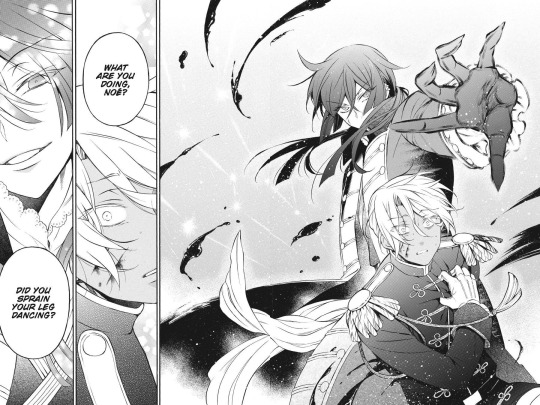
That's how Noé sees Vanitas. He is portrayed as radiant here, and the reason isn't just because he saved him from Naenia, but because Noé saw Vanitas saving several vampires using the Reverse operation, which gives him hope.
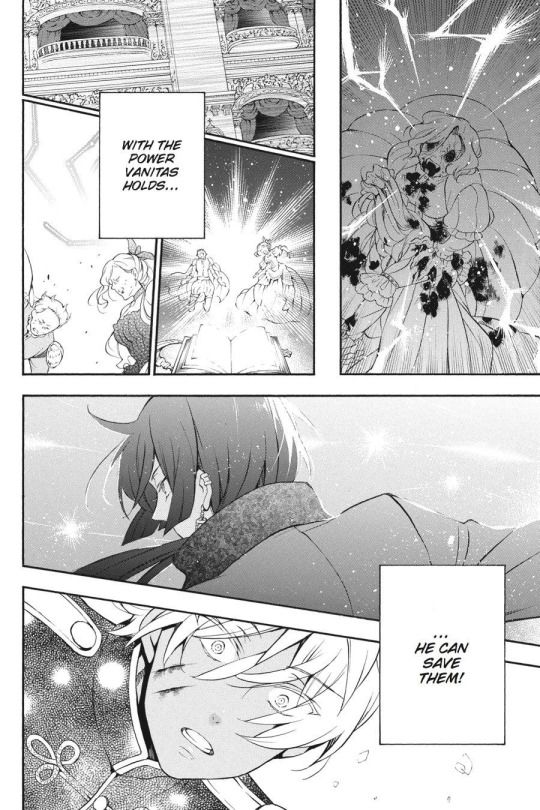
Vanitas is seen as a saving figure because it restored Noé's hope. After all, he experienced the loss of his childhood friend due to Curse bearer degeneration and this happen right after Naenia made him remember that.
However, when Vanitas fails to save Catherine and kills her instead, the portrayal/way Noé's view him changes
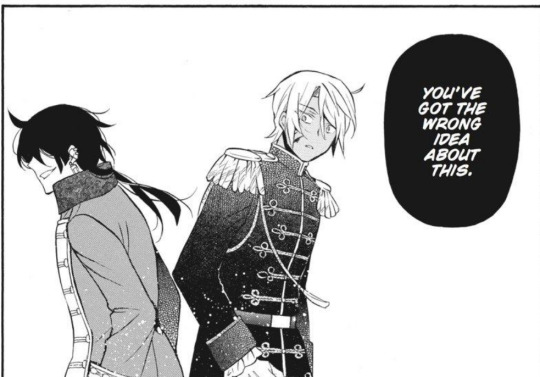
Vanitas's dialogue is in a dark bubble leading to understand the dialogue has a dark connotation which worries Noé creating a transition
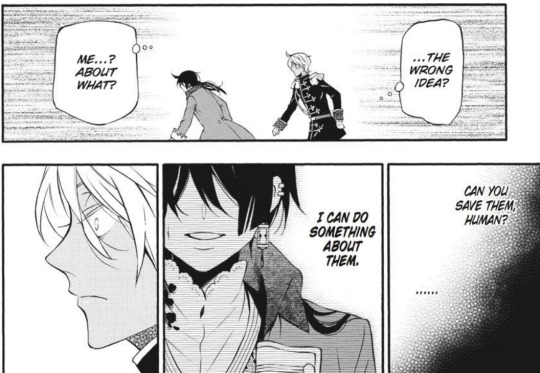
The panel where darkness seems to be growing and thus contrast with the light panel where Vani's hair shines brighter with the use of trame; replaced now by ink to signify darnkess as taken over, and here it's in Noé's vision.
When we are at the point where he will kill Catherine, Noé becomes more hesistant, the look on the panel showing his anxiety and then

He remembered the face Vani made when he claimed to save all the Vampires but with the dialogue he said a bit earlier, and while many commented on how threatning this face is, the fact that Noé remember this face right as Vanitas is about to kill Catherine says a lot on how he ended up viewing him very differently from the moment Vanitas saved him.
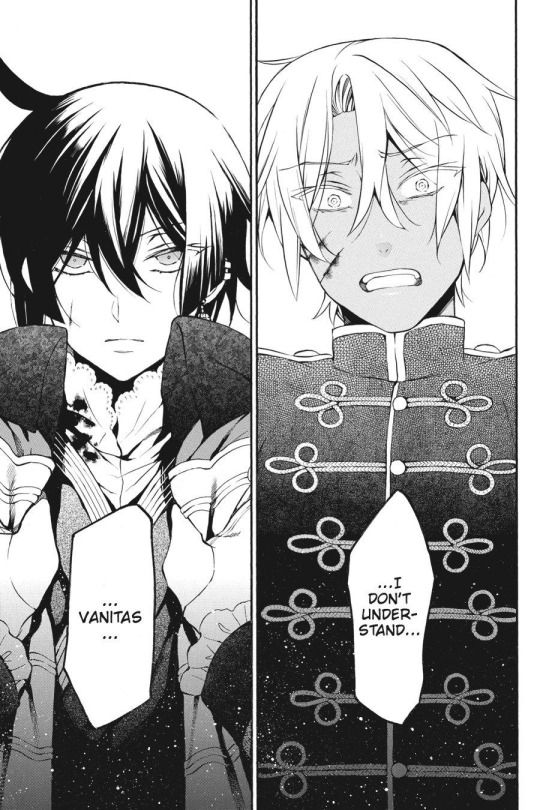

With this example, you can see that Noé's perception is limited to what he knows of the thing he see, modeling how he sees things.
By the time of chapter 52, Vanitas could have once again appears in his soft side, having saved Chloé and having Noé learn about his own insecurities. But in this chapter, Vanitas threaten to kill his childhood, friend, hence he doesn't view him anymore as the same and is unable to focus on him. An blatant example is how he failed to notice that Vanitas made this face when he tried to attack him.
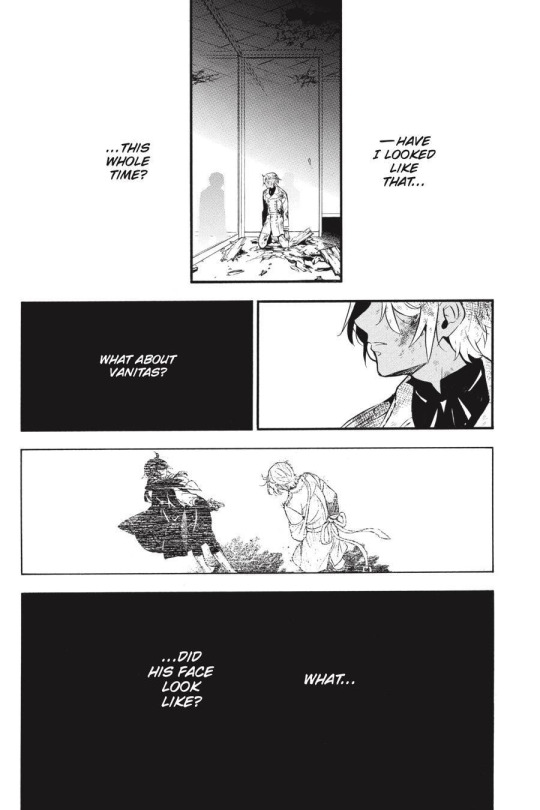
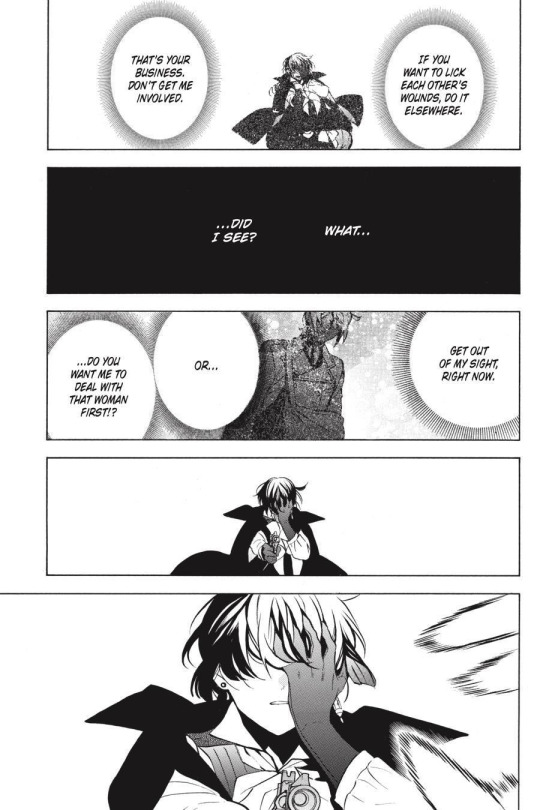
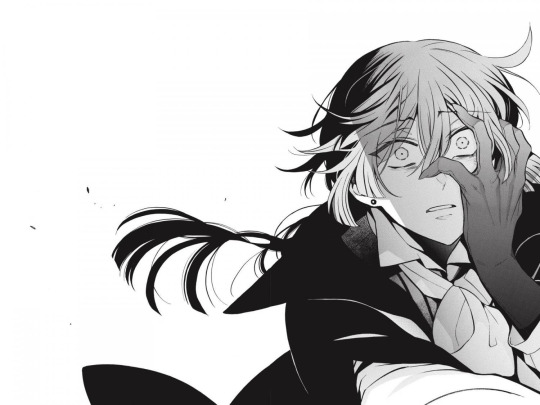
He will admits it himself, but it isn't before Jeanne, an objective watcher call hims out

That he snaps out. And even then he doesn't understand
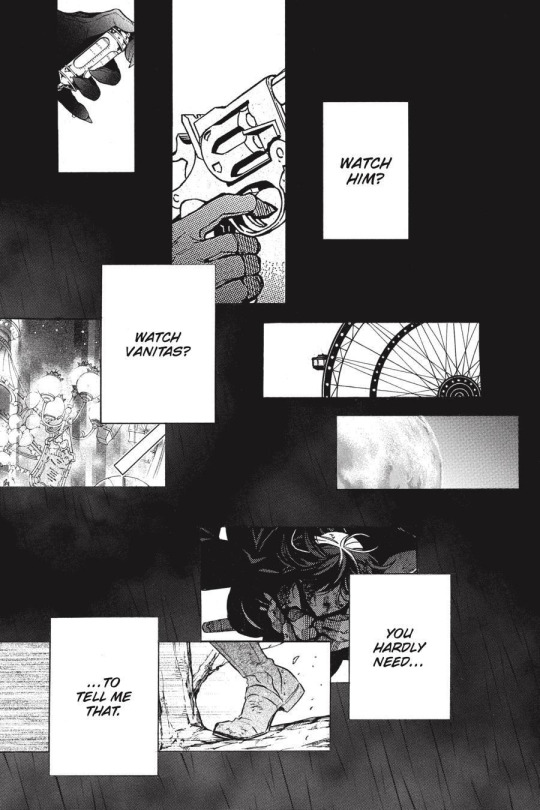
Until he sees himself in the mirror

The fact that Noé's vision of Vanitas is shaped by what Vanitas let him see of him, coupled by his blind self makes him an unreliable narrator, especially when it comes to what VNC is about : knowing who Vanitas is.
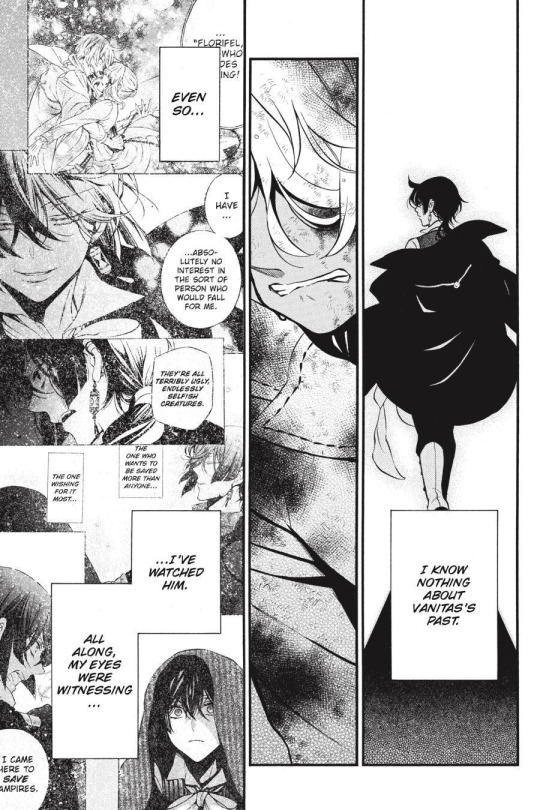
Hence, I think Noé's eyesight is actually refering to this element, that he is figuratively blind. At least for now.
But it should also be noted that Noé and Vanitas don't view the same thing in the same way as they have different knowledge of it and I think nothing illustrates it better then their duet song, Le Formidable where the chorus goes as such :
I walk into this
useless (Vanitas)
wonderous (Noé)
world
The chorus and some of the verse are constantly showing the dichotomy of how these two sees the world, contrasting between Noé optimism view and Vanitas's pessimistiv view, and the two untertwining creates a sense of discontinuity within the lyrics as the song keeps switching between their 2 POV which is complete polar opposite and this is more notable when the song comes to the chorus where both voices finally sings together and seems to have finally meet, but to show that while they live in the same world and lives the same adventures, they don't view things in the same way.
Now talking about Tirésias. He was a mythic poet that was cursed with blindness but the gods granted him in compensation the gift to see the future and he became a famous fortune teller. This is actually linked to an old, old belief about blindness. That although they can't see, the are gifted with a knowledge unabling them to see what is invisible to the common man. And while blind people often have sharpended sense, this is also linked to the old belief that the poet as prophetic talents.
So how does it link with Noé ?
Noé is actually an entity that is double : with have past Noé, the character and present Noé, the narrator/writer of the story. Past Noé is blind, but present Noé, while a potentially unreliable narrator is the one that knows how the story ends. After all, the end of chapter 1 sounds like a premonition.
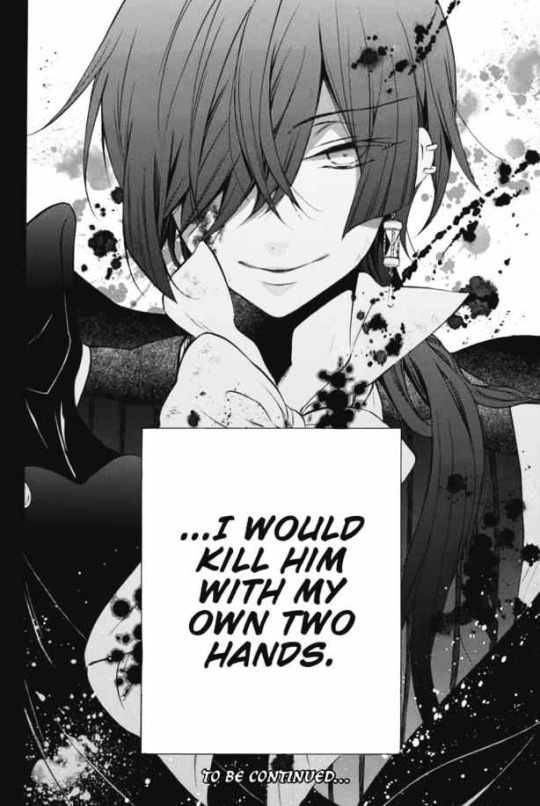
And that's because it already happen. Like for Oedipus that couldn't escape his fate, the story Noé is telling is bound to end like that because it's what the narrator already experienced. There is that critic Jean Paul Sartre made about true stories not existing arguing that the moment you tell a story when you know the ending of it, it cease be authentic because we don't know how things are supposed to end. And indeed, no one but God can know what will happen in the future. It is what is name the occult, ot "what is hidden"... what people used to believe blind people could see as compensation for their defective eyesight.
That add up to the fact Noé was shown to be literaly defective within his eyesight due to his injury. But canonically Noé has the power to know something that others vampire in particular can't. As an Archiviste, he can knows the past of someone by drinking their blood and looking into their memories, which got him to have a lot of people looking down on him for that has it's allowing him to look on what is intimate, etymologitically, what is deep inside of them, that which they occult. And in the case of Vanitas in particular, it's something that 1/ Vanitas don't want him to know 2/Noé admits in chapter 52 to not know.
However, as I mentionned the narrator knows the ending of the story, which contrast with how Noé is ignorant of the events of VNC compared to his future self narrating the story. And in chapter 56, there is finally a hint of him learning his irremediable fate
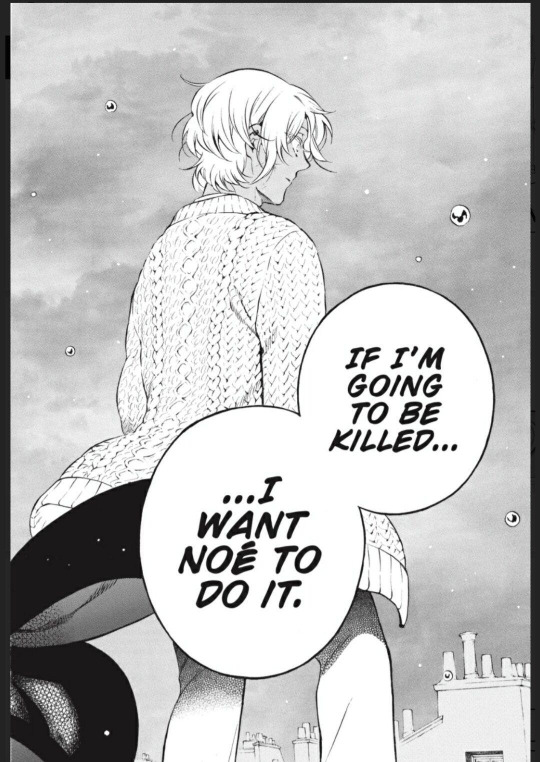
From the mouth of Vanitas, Noé learns what is future self already knew and told the audience.
This might be an indicator that Noé will manage to pass of his initial blindess as he tells the story and thus recover a proper eyesight, signifying be able to see things other then through a veil of ignorance/innocence/subjectivity.
And this can be seen as through VNC, there are clear instance of Vanitas moments focused when Noé was simply not here, and thus should not know about it, specially when Vanitas nevers tell him about it, such as his meeting with Jeanne at the ball, his discussion with her during the lunch Lucas invited them to partake, their meeting at the ball, their date in Paris or in the cabine.
There is also the fact that he relates his meeting with Ruthven in the meantime, when he should have forgotten about it. Or, the most obvious piece of evidence, the fact that he was able to convey how Vanitas felt when he attacked him even though the chapter made it clear Noé had no idea on how he looked like
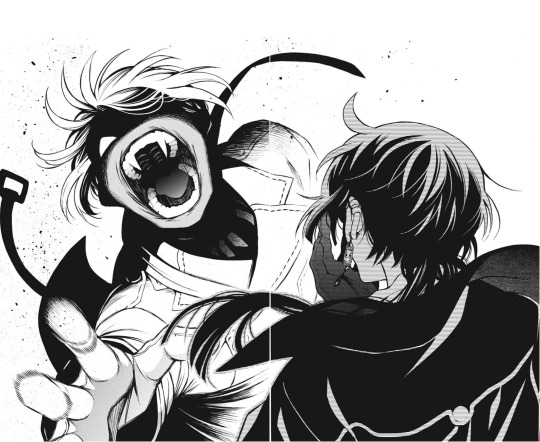
This for instance, shows that Noé/narrator was able to overcome his own biais and overcome the fact he would have remained an unreliable narrator had his vision not changed.
Long story short is that Noé/narrator knows and see what Noé/character doesn't know/see and shows us the ignorance he had at the time, while keeping in mind that Noé/character doesn't know while Noé/narrator is the one who knows everything. What is going to happen, how it is going to unfold.
Thus it is very important to remember that what Noé/character sees will constantly be challenged by what his future self saw and therefore knows.
And considering that VNC heavily deals with how Noé's vision of the world is constantly challenged throughout the story, I think it is possible that his character would evolve in such a way
#vanitas no carte#the case study of vanitas#vanitas no shuki#jun mochizuki#noé archiviste#meta analysis#manga analysis#greek mythology
91 notes
·
View notes
Text
This panel stuck out to me when it showed up in TriMax Chapter 3, but honestly, I wasn't quite sure what to make of it at the time. Or, rather, I wasn't sure where Nightow might be going with it.

Meryl is trying to defend her time with Vash as not being a that bad, but then her coworker (amazingly named Karen) calls her out, telling her that, as a woman, there's no way Meryl could have been happy having her life constantly threatened while running around with Vash.
My first instinct is to defend Meryl, to shoot back at Karen that what defines Karen's life may not define Meryl's, and Meryl might be the more adventurous type who genuinely doesn't mind the danger. And besides, having one's life constantly under threat is psychologically wearing on anyone regardless of gender. So shouldn't she just shut her yap?
But then these words come up again later in the chapter. For (what I think is) the first time in the series, Meryl finds herself with an actual loaded gun leveled directly at her head by a person who fully intends to pull the trigger. She has no known help in sight, and the gunman calling her foolish makes her remember what Karen said.

And Meryl just... closes her eyes, and she thinks about all the danger she's been in with everyone from Gosef to E.G. Mine. She thinks about the Fifth Moon Incident. And she thinks about Vash.

But she doesn't think of gunman Vash. She doesn't think of Vash in a panic telling her to run away from danger, of Vash fleeing for his life over and over and over again.
She thinks of him smiling.
Not only is he smiling, but compared to the darkness and chaos of the other panels, he's a beacon of light in those memories. (You can almost hear the tense, dark music that's been flowing through the scene break into something lighter at his appearance.) And that image of him smiling kindly, still striving for love and peace, grows to dominate her mindscape.
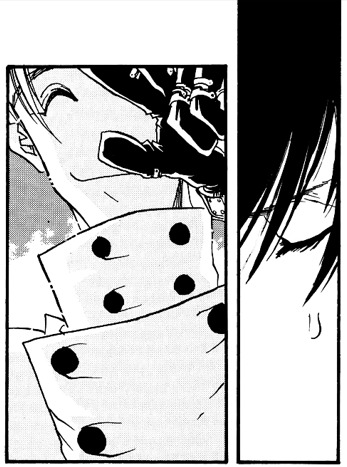
It would be easy to write this off as her growing crush on Vash, or as her seeing him telling her that it's alright and dealing with things like being hunted and having your life regularly threatened aren't actually that bad, that perhaps these things appeal to a sense of adventure and/or what makes life worth living. After all, we've seen similar messages come up in similar fashions in so many other anime and manga series.
But that's not what Meryl concludes from it. Instead, she thinks about Vash's smiling face and concludes her coworker is right. There isn't a way for she, Meryl, to truly be happy when she's constantly getting thrown into these situations.

Her conclusion doesn't end there, though. She doesn't look at the situation and go, "Well, I guess it's time for me, a girl, to throw in the towel so I can pursue a happier existence."
Instead, she concludes that she has to keep doing this sort of thing anyway regardless of any danger or fulfillment.
She realizes that what she dealt with for the time she followed Vash around was crazy and terrifying and, yes, life-threatening. And she realizes that this is how Vash lives all the time. Unlike her, it's not something he has the option to just tap out of when the mood suits. As we were shown in the previous two chapters, Vash genuinely can't just make a new life or career choice or whatever and just... hunt for his own happiness instead. Chaos is going to follow him unbidden wherever he goes.
But he keeps going. And he doesn't just keep going, but through it all he keeps smiling kindly at others, offers them encouragement, and despite all he's seen and been through, keeps trying harder to work for a world with more love and peace. Not because it's safe or happy or appeals to a sense of adventure. It's none of those things. He continues on this path because it's the right thing to do.
Meryl realizes the same thing is true for her. Accepting another assignment from the company to follow Vash around isn't going to bring her the kind of life Karen suggested was ideal. In fact, it's more likely that following in Vash's footsteps (whether figuratively or literally) is going to end up with Meryl in additional stressful situations with her life on the line far more than is truly reasonable for anyone (regardless of gender). It isn't necessarily going to bring her happiness. It certainly isn't going to bring her peace.
But it's the right thing to do, which makes it the only path forward for her, and so she'll embrace it despite all the struggles it brings.
#meryl stryfe#character analysis#manga analysis#trigun#trigun maximum#volume 1#trigunbookclub#pancake thoughts
604 notes
·
View notes
Text
M!IK evolved from being a story about recovery from parental abuse to being a narrative on how education and inclusivity can defeat fascism - and it did so in the funniest and most wholesome way
Chef's kiss
#mairimashita! iruma kun#mairuma#m!ik#manga#manga analysis#welcome to demon school iruma kun#iruma#welcome to demon school#i love this so much
671 notes
·
View notes
Text
Someone smarter and more eloquent than me should analyze the genius way paneling is used in Shimeji Simulation to not only draw the reader's eye but enhance the atmosphere and symbolism in the story
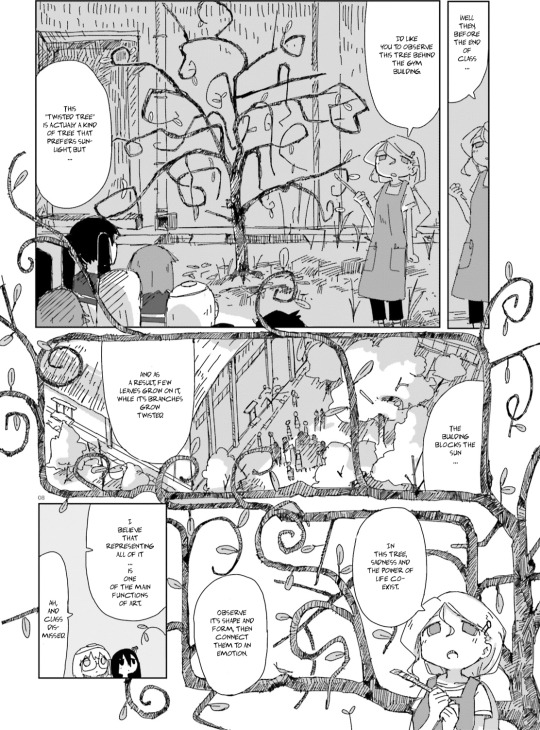

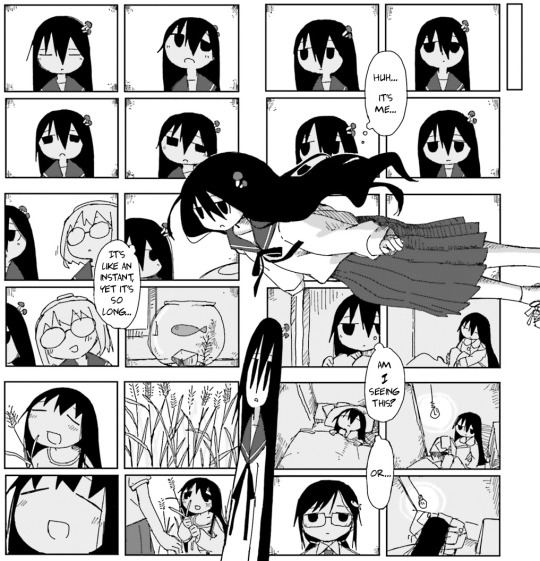

41 notes
·
View notes
Text
Orihime's Powers and Representation
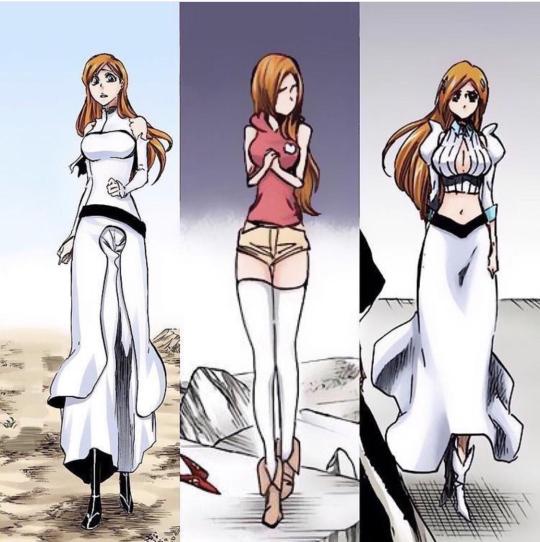
Orihime's power in regards to her characterization. Orihime is an idealist. She exists in a very violent world, yet refuses to fight unless she's under really terrible pressure. She used to see Ichigo as her Prince Charming, her Knight in Shining Armor, until she realized that is simply wasn't the case. The girl was pretty much living in her own little fantasy world to cope with her HUGE troubles, which is why yanking her out of it and making her face a reality so stange to her own left her so distraught. So what do her powers do exactly? Reject reality.
Also in regards to Orihime, the reason why Loly and Menoly hate her even more after she uses her Reality Warper powers to bring them back to life. is more complicated than just being two ungrateful sadists. To start, Hollows/Arrancar/Espada as a whole are beings that are born when souls don't cross to Soul Society and stay in our world, becoming corrupted with supernatural energies. And here, two Arrancar girls (Hollows who have removed their mask and gained Shinigami-like powers) have witnessed how a lowly human has the power to undo death, pretty much messing with everything they know about their own existence. What is a crowning moment for Orihime, in the view of these two girls (and especially Loly, who had a better look at all of this than Menoly since she was horribly mutilated by Grimmjow yet she was not dead) is like catching view of an abomination, which explains the whole "she's a monster" deal.
Hollows, beings that are born from death, despair and fear, are being faced with a being who can literally rewrite reality so that events do not occur. Taken in this context, Orihime is less like an angel of mercy to these two and more like a God from their perspective. A being whose nature and abilities are so alien that they outright defy explanation. Considering this, its understandable that they would react less than pleasantly to what happened to them.
Further to the above point on Orihime's character in relation to her powers — there's a very specific reason why Orihime actually used to be useless on the battle field, and it's not any kind of limit on her power. It's been heavily alluded to that Orihime's power is pretty much limited by her own imagination. Naturally, when it comes to helping people, her healing powers can reverse pretty much anything. However, think about who Orihime is. She wouldn't hurt a fly if she could help it. She can take down random Hollows like that mook that was attacking Tatsuki in the school because it's monstrous in appearance, and they'll hurt more people if she doesn't attack. Place a humanoid enemy in front of her, and will take her a while to see that she should consider them an enemy, and she simply cannot attack them unless it's really needed. This is why Tsubaki's power will always be the most limited of her set.
Actually, about Tsubaki... think about the Shiten Koushun aka Shield of Four Heavens' Resistance. How is it formed? Via adding Tsubaki to the Three God Reflection Shield, thus making him turn a defensive barrier into an offensive weapon. Tsubaki is the weakest of the six Rikka spirits as well as the one who's less like her, personality wise; and the ones forming the Reflection Shield (Hinagiku, Lilly and Baigon) are relatively similar to her in character. This means that, if she wants to join the battle effectively, Orihime must accept to use Tsubaki yet not by simply sending him off towards the enemy (like many of her haters want her to), but by integrating him to the side that she dominates the most. Only by using Tsubaki in combination with Hinagiku, Lily, and Baigon can she draw his attack potential... mirroring how Orihime must now fight alongside Ichigo, Chad, and others if she wants to not stay behind. Also, when was the Shiten Koushun seen first? When she and Ichigo were attacked by Ginjou. Who was actually a humanoid enemy (more exactly the formwr Substitute Shinigami, but we didn't know that back then, and neither did she). This means that Orihime either is working on the issue mentioned above or has already gotten past behind it.
As for her Santen Kesshun (Three God Reflection Shield)? It too, is not the fragile thing it seems to be. It is specifically stated to Reject an attack and its consequences. It stands to perfectly good reason that it doesn't matter if the shield shatters instantly or not — another can always be thrown up. What matters is that whether the shield shatters or not, it genuinely DOES reject the attack that hits it.
Furthermore, it actually makes a ton of sense that it shatters so easily, too. Orihime's powers are a form of reality warping, after all, being what Aizen calls "the Rejection of Events"; she's essentially the Queen of Retcons. When her base shield blocks an attack, it also retcons that attack out of existence. But then, that raises the question... if there was never any attack to block, then why would she even make a shield in the first place? The reason it shatters isn't that it's fragile; it's the shield disappearing in a Puff of Logic because the attack it was meant to block suddenly never existed in the first place.
As for her Santen Kesshun (Three God Reflection Shield)? It too, is not the fragile thing it seems to be. It is specifically stated to Reject an attack and its consequences. It stands to perfectly good reason that it doesn't matter if the shield shatters instantly or not — another can always be thrown up. What matters is that whether the shield shatters or not, it genuinely DOES reject the attack that hits it.
Furthermore, it actually makes a ton of sense that it shatters so easily, too. Orihime's powers are a form of reality warping, after all, being what Aizen calls "the Rejection of Events"; she's essentially the Queen of Retcons. Logically, when her base shield blocks an attack, it also retcons that attack out of existence. But then, that raises the question... if there was never any attack to block, then why would she even make a shield in the first place? The reason it shatters isn't that it's fragile; it's the shield disappearing because the attack it was meant to block suddenly never existed in the first place.
#tite kubo#anime thoughts#anime and manga#orihime#pro orihime#orihime inoue#bleach orihime#bleach#bleach ichigo#pro ichihime#ichihime#ichigo x orihime#ichigo#ichigo kurosaki#manga analysis#orihime kurosaki#bleach anime
94 notes
·
View notes
Text
HELLO AGAIN, SUKUNA ENJOYERS !! remember almost a month ago, i posted about part 1 of a friend’s sukuna lost in translation analysis ?
she just finished and posted a part 2 !! for those who have been waiting for it, it’s here now ! there’s no “lost in translation” in this one, mainly an analysis going deeper into sukuna’s character which i think many will enjoy .
again, user is @/societyhater_ !!
some images below so people have an idea of how it’s structured. link to the full version will be after the selected images so please read the whole thing if you are interested!
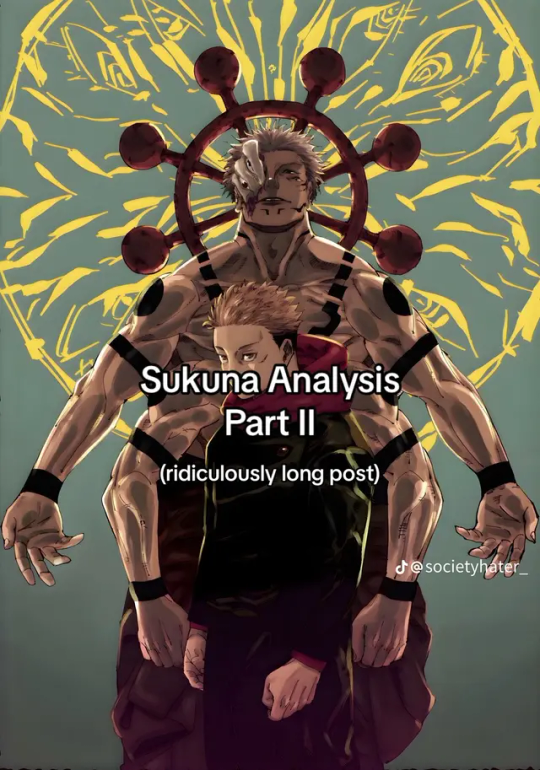
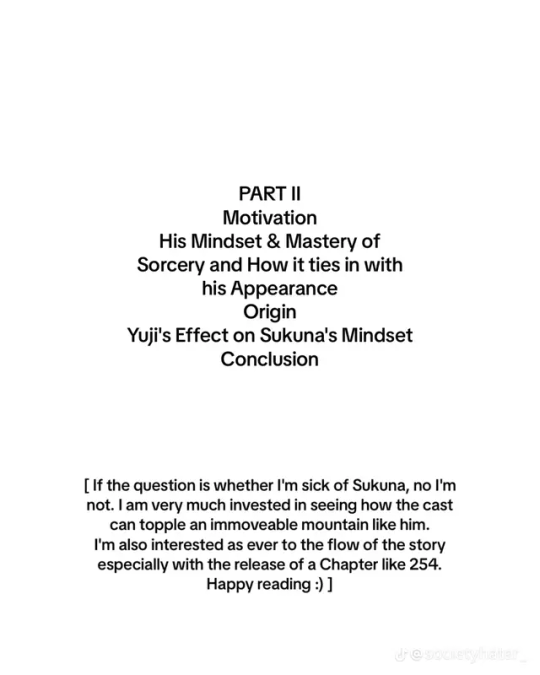
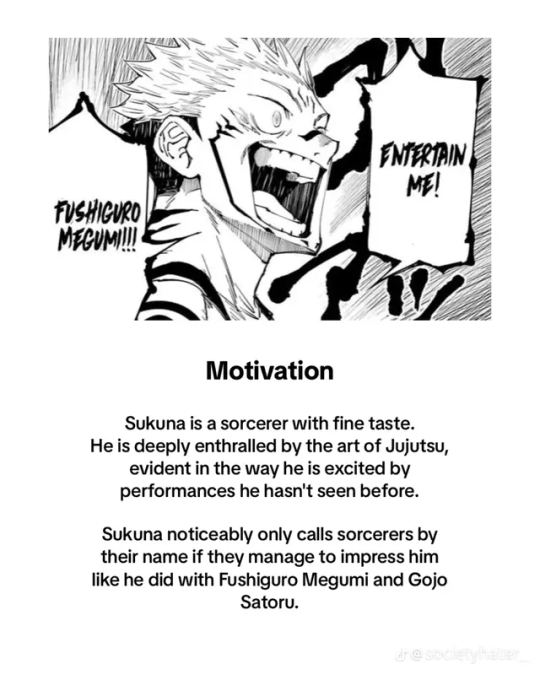
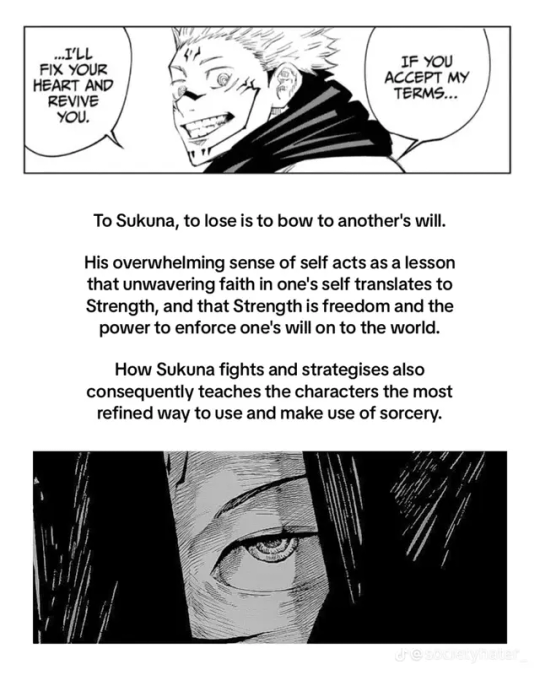

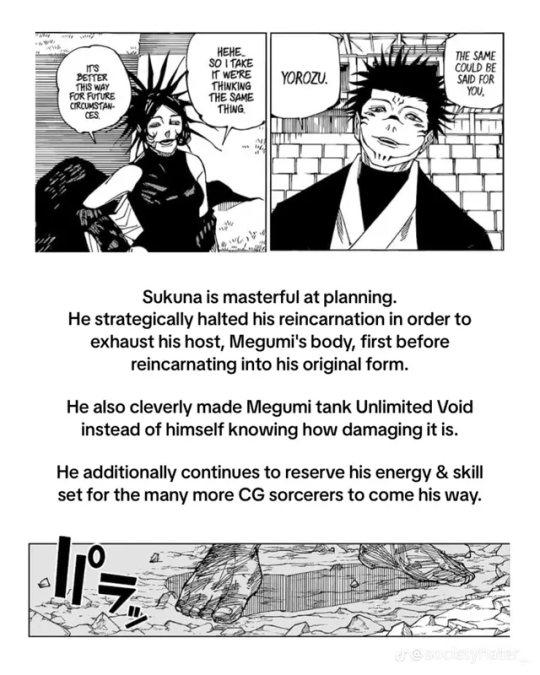


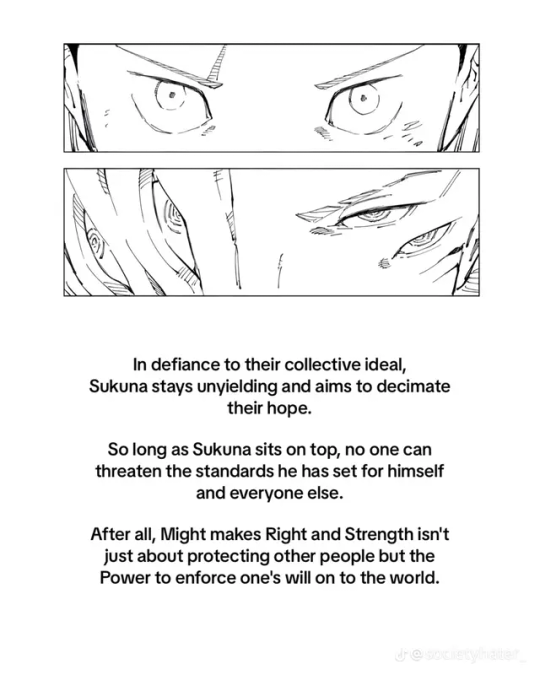
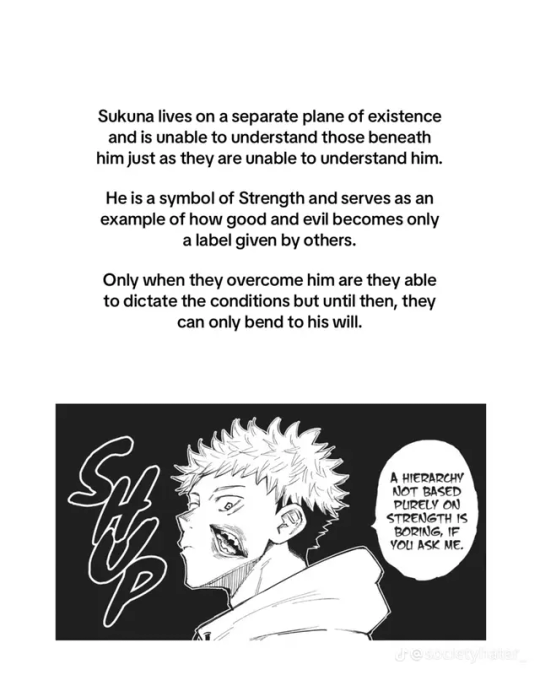
#part 2 of the suku analysis !!#again i recommend checking out her other posts too :]#another banger ueheuehe#jujutsu kaisen#jjk#sukuna#ryomen sukuna#manga analysis#text analysis#character analysis
27 notes
·
View notes